
100+ Space Research Topics [Updated]

Space has always attracted humanity’s imagination. The vastness of the cosmos, with its twinkling stars, mysterious planets, and enigmatic black holes, beckons us to explore its depths. But why do we study space? What are the research topics that drive scientists to reach for the stars? In this blog, we’ll delve into the fascinating world of space research topics, exploring key topics that continue to inspire and challenge researchers around the globe.
Why Do We Study Space?
Table of Contents
Here are some key points explaining why we study space:
- Understanding our Origins: Space research helps us uncover the origins of the universe, including how galaxies, stars, and planets formed.
- Advancing Scientific Knowledge: Studying space leads to breakthroughs in physics, astronomy, and other scientific fields, expanding our understanding of the cosmos.
- Technological Innovation: Space exploration drives the development of new technologies, such as satellite communication and medical imaging, benefiting society as a whole.
- Exploration and Discovery: Humans are inherently curious, and space offers a vast frontier for exploration, fueling our desire to discover new worlds and phenomena.
- Earth Observation: Space-based observations provide valuable data on Earth’s climate, weather patterns, and environmental changes, aiding in disaster management and conservation efforts.
- Search for Life: Investigating other planets and celestial bodies helps us understand the conditions necessary for life, potentially leading to the discovery of extraterrestrial life forms.
- Inspiration and Education: Space exploration inspires future generations of scientists, engineers, and explorers, fostering innovation and curiosity about the universe.
100+ Space Research Topics: Category Wise
Astronomy and astrophysics.
- Exoplanet detection methods and recent discoveries
- The life cycle of stars: from birth to death
- Supermassive black holes and their role in galaxy formation
- Gravitational waves: detection and implications
- Dark matter and dark energy: understanding the mysteries of the universe
- Supernovae explosions: studying the aftermath of stellar deaths
- Galactic dynamics: exploring the structure and evolution of galaxies
- Cosmic microwave background radiation: insights into the early universe
- Gamma-ray bursts: uncovering the most energetic explosions in the cosmos
- The search for extrasolar planets with potential habitable conditions
Planetary Science
- Martian geology and the search for signs of past life
- Jupiter’s Great Red Spot: dynamics and longevity
- Saturn’s rings: composition, structure, and origin
- Lunar exploration: past missions and future prospects
- Venusian atmosphere: understanding the greenhouse effect and extreme conditions
- Io, Europa, Ganymede, and Callisto: Jupiter’s diverse moons
- Titan: Saturn’s moon with an Earth-like atmosphere and hydrocarbon lakes
- The Kuiper Belt and Oort Cloud: reservoirs of comets and icy bodies
- Dwarf planets: Pluto, Eris, Haumea, Makemake, and Ceres
- Planetary volcanism: processes and consequences on various celestial bodies
Space Technology and Engineering
- Satellite constellations for global internet coverage
- CubeSats: miniaturized satellites for scientific research and technology demonstration
- Space debris mitigation strategies and technologies
- Ion propulsion systems: efficient propulsion for deep space missions
- Space telescopes: next-generation observatories for astronomy and astrophysics
- Space-based solar power: harvesting solar energy in orbit
- Asteroid mining: extracting resources from near-Earth objects
- In-situ resource utilization on other planets and moons
- Additive manufacturing (3D printing) in space exploration
- Autonomous spacecraft navigation and control for long-duration missions
Astrobiology and the Search for Life
- Extremophiles: organisms thriving in extreme environments on Earth and their implications for extraterrestrial life
- Biosignatures: markers of past or present life on other planets
- Methanogenesis on Mars: potential evidence for subsurface microbial life
- Europa’s subsurface ocean: exploring the possibility of life beneath the ice
- Enceladus: hydrothermal vents and the search for life in its subsurface ocean
- The habitability of exoplanets: assessing conditions for life beyond the solar system
- Panspermia: the transfer of life between celestial bodies
- Astrobiology field research in extreme environments on Earth
- SETI: the search for extraterrestrial intelligence and communication
- The implications of discovering microbial life on Mars or other celestial bodies
Space Policy and Ethics
- International collaboration in space exploration and research
- The Outer Space Treaty: principles governing the use of outer space
- Space tourism regulations and safety considerations
- Space law and jurisdiction: legal frameworks for activities in space
- Military applications of space technology and potential arms race in space
- Space resource utilization and ownership rights
- Space environmentalism: advocating for the protection of celestial bodies and their environments
- Space colonization ethics and implications for human societies
- Space governance beyond national boundaries
- Cultural heritage preservation on the Moon and other celestial bodies
Challenges and Future Directions
- Funding challenges and opportunities in space research and exploration
- Space radiation hazards and mitigation strategies for astronauts
- Interplanetary communication and navigation for deep space missions
- Long-duration spaceflight: physiological and psychological effects on astronauts
- Terraforming Mars: engineering a habitable environment on the Red Planet
- Space elevator concept: a revolutionary approach to space access
- Next-generation space launch vehicles and propulsion technologies
- Nuclear propulsion for crewed missions to Mars and beyond
- Space settlement design and infrastructure requirements
- Advancing artificial intelligence and robotics for autonomous space exploration
Space Weather and Space Environment
- Solar flares and coronal mass ejections: impacts on Earth’s magnetosphere and technology
- Space weather forecasting and its applications in satellite operations
- Magnetospheres of Earth and other planets: comparative studies and dynamics
- Solar wind interactions with planetary atmospheres and magnetospheres
- Aurora phenomena on Earth and other planets
- Radiation belts: understanding and mitigating hazards for spacecraft and astronauts
- Cosmic rays: sources, composition, and effects on space missions
- Space climate change: long-term variations in solar activity and their consequences
- Space weather effects on satellite communications, navigation, and power systems
- Space weather monitoring and prediction networks
Space Exploration and Missions
- Mars Sample Return mission: challenges and scientific objectives
- Artemis program: NASA’s plans for returning astronauts to the Moon
- Asteroid impact mitigation strategies and planetary defense initiatives
- The James Webb Space Telescope: capabilities and scientific goals
- Europa Clipper mission: exploring Jupiter’s icy moon for signs of habitability
- China’s Chang’e lunar exploration program: past achievements and future missions
- Commercial crew and cargo transportation to the International Space Station
- Voyager and Pioneer missions: the farthest human-made objects in space
- Space missions to study near-Earth objects and potential asteroid mining targets
- International Mars exploration collaborations and missions
Space Communication and Navigation
- Deep space communication networks and relay satellites
- Laser communication technology for high-speed data transmission in space
- Satellite-based navigation systems: GPS, Galileo, and GLONASS
- Interplanetary Internet: protocols and architectures for space communications
- Radio astronomy and interferometry: probing the universe with radio waves
- Quantum communication in space: secure and ultra-fast communication channels
- Delay-tolerant networking for deep space missions
- Autonomous navigation systems for spacecraft and rovers
- Optical communications for small satellites and CubeSats
- Space-to-ground communication systems for remote sensing and Earth observation satellites
Space Medicine and Human Spaceflight
- Microgravity effects on human physiology and health
- Countermeasures for mitigating bone and muscle loss in space
- Psychological challenges of long-duration space missions
- Space food technology: nutrition and sustainability in space
- Medical emergencies in space: protocols and procedures for astronaut health care
- Radiation shielding and protection for crewed missions beyond Earth orbit
- Sleep and circadian rhythms in space: optimizing astronaut performance
- Artificial gravity concepts for maintaining crew health on long-duration missions
- Telemedicine applications for space exploration missions
- Bioastronautics research: advancing human spaceflight capabilities and safety
Space Industry and Commercialization
- NewSpace companies: the rise of private space exploration ventures
- Satellite constellation deployments for global internet coverage
- Space tourism: opportunities, challenges, and market trends
- Commercial spaceports and launch facilities around the world
- Space manufacturing and in-space assembly techniques
Tips To Write Space Research Papers
Crafting space research papers can be a thrilling and fulfilling pursuit, yet it demands meticulous planning and implementation to guarantee that your efforts effectively convey your discoveries and make meaningful contributions to the discipline. Here are some tips to help you write space research papers:
- Choose a Narrow Topic: Space is a vast field with numerous sub-disciplines. Narrow down your topic to something specific and manageable, ensuring that it aligns with your interests and expertise.
- Conduct Thorough Research: Before you start writing, immerse yourself in the existing literature on your chosen topic. Familiarize yourself with key concepts, theories, and recent discoveries to provide context for your research.
- Develop a Clear Thesis Statement: Define the central argument or hypothesis of your paper in a concise and focused thesis statement. This statement should guide your writing and serve as the foundation for your research.
- Outline Your Paper: Create a detailed outline outlining the structure of your paper, including the introduction, literature review, results, and conclusion sections. This will help you organize your thoughts and ensure that your paper flows logically.
- Write a Compelling Introduction: Begin your paper with a captivating introduction that offers context about your subject, underscores its importance, and delineates the paper’s framework . Grab the reader’s interest and inspire them to delve further into your work.
- Provide a Comprehensive Literature Review: Synthesize the existing research on your topic in a literature review section. Examine pertinent research, theories, methodologies, and results, pinpointing any disparities or deficiencies in the existing literature that your study seeks to rectify.
- Detail Your Methodology: Describe the methods you used to conduct your research, including data collection, analysis, and interpretation techniques. Provide enough detail for readers to understand how your study was conducted and to evaluate its validity and reliability.
- Present Your Results Clearly: Present your research findings in a clear, concise manner, using tables, figures, and charts to illustrate key data points. Interpret your results objectively and discuss their implications in relation to your research question or hypothesis.
- Engage in Critical Analysis: Analyze your findings in the context of existing literature, discussing their significance, strengths, limitations, and potential implications for future research. Be critical and objective in your evaluation, acknowledging any potential biases or limitations in your study.
- Craft a Strong Conclusion: Summarize the main findings of your research and reiterate their significance in the conclusion section. Discuss any implications for theory, practice, or policy and suggest avenues for future research.
- Proofread and Revise: Before submitting your paper, carefully proofread it for spelling, grammar, and punctuation errors. Edit your writing to ensure clarity, coherence, and consistency, guaranteeing that your points are adequately backed and logically organized.
- Follow Formatting Guidelines: Follow the formatting instructions provided by the journal or conference to which you intend to submit your paper. Pay attention to details such as font size, margins, citation style, and reference formatting to ensure that your paper meets the publication requirements.
Space research offers a window into the vastness of the cosmos, revealing the beauty and complexity of the universe we inhabit. From the depths of space to the surfaces of distant planets, scientists are uncovering new wonders and answering age-old questions about our place in the universe. As we look to the stars, let us be inspired by the spirit of exploration and discovery that drives humanity ever onward, towards new horizons and unknown worlds. I hope you find the best space research topics from the above list.
Related Posts

Step by Step Guide on The Best Way to Finance Car

The Best Way on How to Get Fund For Business to Grow it Efficiently
Leave a comment cancel reply.
Your email address will not be published. Required fields are marked *
Custom Essay, Term Paper & Research paper writing services
- testimonials
Toll Free: +1 (888) 354-4744
Email: [email protected]
Writing custom essays & research papers since 2008
154 hot astronomy research topics for a-grade papers.
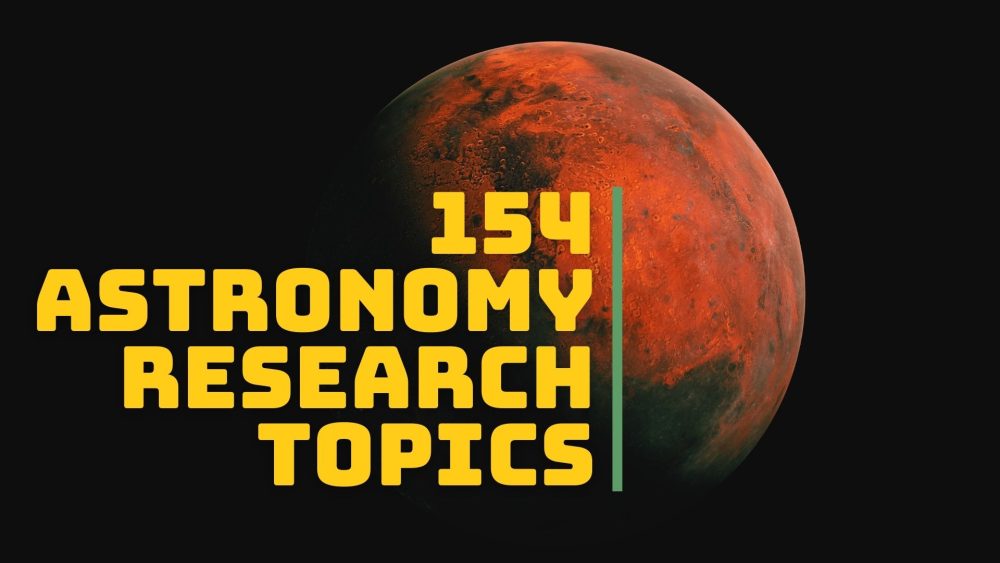
Do you have a college astronomy paper or essay and have been wondering how to get the best topic? You might also be stuck with the paper, wondering how to go about it.
The truth about astronomy is that getting interesting space topics is never easy, but how do you address the challenge? There is no need to worry anymore because we are here to help.
In this post, we list 154 astronomy paper topics and further highlight the traits of a great research paper. Why get content with standard or low-quality paper when you can get the best in your class by checking out the guide and topics, as well as getting lab report help ?
What Is Astronomy?
Before looking at the leading space science topics for your university assignment, let’s start with the definition. Astronomy is the study concerned with researching and understanding everything that takes place beyond the earth’s atmosphere. Although the advances in technology, especially on telescopes, satellites, and manned space vehicles, have helped people to peep deeper into space, this is just a scratch on the surface. There is a lot more waiting to be explored, including the controversial question, “Is there life on other planets?”
Characteristics Of A Good Astronomy Research Paper
From the definition of astronomy, it is clear that you can have a long list of astronomy project topics or ideas. Once you have picked the preferred option from our research topics in cosmology, the next step is preparing your paper. Here are the main characteristics of a good school research paper in astronomy:
- Systematic: This means that your research paper should be structured per clearly defined rules. So, students should start by reviewing requirements by their professors or teachers and think creatively of how to make their papers professional.
- Logical: This implies that the student carefully reasons all the points to ensure they support the selected topic. Although there is so much one can write on a specific topic, you must narrow it down to those points that are current and that support your topic.
- Comprehensive: Your paper also needs to be as comprehensive as possible. So, you must exhaustively identify the core points in a selected topic. It should also fit well in the current literature on the same topic, helping to advance the discipline.
- Plagiarism-Free: All universities out there have very strict rules on plagiarism. Therefore, your work must be 100% original.
- Clearly flowing points and free from errors: Finally, your paper should be arranged well to ensure that all the points flow logically from the start to the end. Again, it should be proofread to ensure it is free from errors.
Best Astronomy Essay Topics
Now that we have looked at the main characteristics of a high quality astronomy paper or essay, it is time to dig deeper into the main topics. Check out our list of the leading astronomy research topics for top grades.
Top Astronomy Research Topics
- What is the future of space exploration?
- A closer review of the big bang theory.
- Compare two theories that explain the origin of the universe.
- Stephen Hawking theories.
- Space Challenger disaster: What are the sociological impacts?
- A review of the recent space exploration breakthroughs.
- The moon landing.
- The Mars landing of space rovers.
- A deeper look at the history of astronomy.
- Reviewing the heliocentric model of the galaxy.
- Analyzing the lifecycle of a star.
- What impact does the moon have on the earth?
- Space debris and its impact on the solar system.
- What impact do humans have on the solar system?
- The rise of space tourism: What impact will it have on space exploration?
- Is space tourism a good thing?
- What could go wrong with space tourism?
- Space manufacturing: Is it a good thing?
- The mythologies associated with heavenly bodies.
- What impact do the stars have on earth?
Unique Astronomy Research Paper Topics
- A review of the Hubble telescope.
- A closer look at the Haley’s comet.
- Through the mind of early astronomers: Galileo Aristotle, and Ptolemy.
- What are the advantages of exploring space?
- The race to explore space and the cold war.
- Reviewing the first astronauts to visit the moon.
- What lessons did NASA learn from its first mission to the moon?
- Can life exist on the moon?
- What is the biggest difference between earth and moon?
- Explaining the earth’s outlook as viewed from space.
- The design of space vehicles: Are the modern models riskier compared to those used in the 20th century?
- What impact will private companies like SpaceX and Blue Origin have in astronomy?
- If we have a space station where scientists travel often, is the idea of space hotels far-fetched? A closer look at Blue Origin’s idea of a space hotel.
- Looking beyond the Milky Way.
- A review of Pluto: How does it compare to other planets?
- How does earth compare to Jupiter?
- Explain the sun’s source of heat and light for millions of years.
- Analyzing the rings of Saturn.
- A review of astronauts physical and health preparedness before setting off for space exploration.
- What effects does long stay in space have on the human body?
- What can astronauts do to reduce the danger of muscle atrophy?
- Zero gravity in space.
Awesome Astronomy Topics To Write About
- What are wormholes?
- A review of the evolution of space exploration changes in history.
- Speed of light travel: what are the implications?
- A closer look at time travel: Theory versus fiction.
- Zero gravity: What impact does it have on astronauts’ health over time?
- The interdisciplinary perspectives of space.
- Astrophysics: A review of the main controversies.
- Explore the possibility of having life on other planets.
- What implications would life on other planets have on planet earth?
- Think of yourself as an astronaut: What would be your reaction upon encounter with aliens?
- Stars and how people use them for navigation.
- Comparing different theories that explain the origin of life on planet earth.
- Space weather.
- How does space weather compare to the earth’s weather?
- Global warming: An astronaut’s view.
- The sun and its relationship with the earth.
- Comparing the sun’s relationship with Saturn and Pluto.
- Robotic space exploration: Is it a good idea?
- Constellations: A review of human interpretations.
- A review of emerging business opportunities in space.
- Space travel for non-astronauts: Is it a good idea?
- Comparing space travelling scientists to tourists: What is the difference?
Engaging Space Research Paper Topics
- What is the difference between planets and asteroids?
- How did the “northern lights” come about?
- Capture hypothesis: A review.
- What caused the Challenger to explode after take-off?
- The challenger shuttle disaster: A review of the preparations.
- What lessons did we learn from the challenger disaster?
- Was the Challenger the greatest failure in NASA’s history?
- Analyzing President Ronald Reagan’s speech after the Challenger disaster.
- Space Challenger disaster analysis: Why we are on the blink of another bigger and deadlier disaster.
- Are the current space policies ample to guide the new era of space travel?
- Dennis Tito: Looking at the experience of the first space tourists.
- Space politics: Is competition a good thing when it comes to space exploration?
- Reimagining the space: What would happen if we suddenly discovered that it was possible to inhabit the moon?
- Space will form the next generation combat zone for superpowers in competition for new resources.
- Factoring the distance and other logistics: Would mining in space be viable?
Great Space Exploration Topics
- A review of three biggest planets that orbit outside the solar system.
- Comparing the characteristics of gas planets to terrestrial planets.
- Fission Hypothesis by George Darwin.
- A review of the Giant Impact Theory.
- Exploring the theories that explain the origin of the moon.
- How long does it take for a new planet to form?
- Imagining a Marxist society living on Mars.
- Exploring the process of formation of the biggest stars in the cosmos.
- Is it possible for light to escape from the black hole?
- Determining the moon’s diameter: How accurate is the method used for calculation?
- Is the Big Bang Theory the best explanation of the origin of the universe?
- Reviewing the fate of the universe.
- Gravitational waves: Why their discovery is so important.
- Monitoring the State of the Environment using Ecologically Clean devices.
- Reviewing the doctrine of Noosphere.
- The legends of Starry Sky.
- The importance of mathematics in space explorations.
Astrophysics Research Topics For Debate
- Relativity theory and gravity.
- What is a variable star?
- Gravity and eclipse.
- Venus: Reviewing its formation.
- The mass of matter and nebulae.
- The Big Bang Theory.
- Brown Dwarf.
- Space manufacturing: What materials and products are manufactured in space?
- What happens during a solar eclipse?
- Celestial mechanics.
- Manned space shuttles.
Discussion Topics In Astronomy
- A thematic review of the heliocentric theory.
- The conflicting theories on the origin of the earth: science versus religion.
- Expecting the worst: What could go wrong with space missions?
- Is the cost and effort for space exploration worth it?
- Beyond the visible universe: What should we expect?
- How does the lunar cycle function?
- The dimensions of light in space: How does it differ after entering the earth’s atmosphere?
- What is astrophysics?
- Nonlinear, slow mode, and fast mode effects.
- Grand unification theories.
- What impact does the moon have on the oceans?
- The longitudes and latitudes of the earth.
- What are the different types of stars?
- The formation and destruction of clouds in the Galaxies.
- Meridian and transit circles: What are they?
- The galaxy cluster growth.
- A review of the molecular cloud.
Investigative Astrophysics Research Topics
- How long does it take to travel to space?
- Which is the most prominent of all planets? Is it earth?
- Survival on other planets? How to make it possible.
- Pluto should not be considered another planet: Discuss.
- Journey to Mars: Should we open it to all?
- Comparing the journeys to the International Space Station (ISS) and the Moon.
- Space keeps expanding: Explain.
- The best defense against killer asteroids.
- How to relate interplanetary matter with space activities.
- The 2012 transit of Venus: A detailed review.
- What do astronauts eat when travelling to space?
Controversial Astronomy Topics For Research Paper
- Militarization of space: Is it avoidable?
- Asteroid mining: Is it a good idea?
- A review of space exploration issues and connection to women.
- State exploration is very important: Approve or disapprove this statement.
- Colonizing other planets: Is it ethical?
- Terraforming on Mars.
- The security challenges of space explorations.
- Space exploration: Does it have any impacts on planet earth.
- Using VR and AR should replace humans for space explorations.
Other Cool Astronomy Topics
- The impact of the sun on water bodies.
- Interstellar extinction: What is the cause?
- What is the deep impact mission?
- Essential requirements for space travel.
- Preparing for space travel.
- Is there an earth-like planet that is habitable?
- Solar systems with two stars: How do they operate?
- Comparing the preparation for space tourists and astronauts.
- Where do asteroids come from?
- What is antimatter?
Seek Help From The Best Paper Writing Service
Now that we have listed the characteristics of a great research paper, are you ready to write the assignment? If you find it challenging, know that you are not alone. A lot of students find it tough because the topics are very broad and require a lot of research. “I need a paper written for me” is a thought of many, not just you. Well, no matter the reason why preparing the paper is challenging, you should seek help from online expert writers.
Our service works with professionals, and you can count on them to the best grade in your paper. They are native English writers with a lot of experience in writing custom astronomy papers. The service is also secure and trustworthy, implying that no one other than you can know that the paper was bought. The writers are also excellent in editing, cheap and fast. They will handle even your papers with very tight deadlines. All that you need is to visit our site and tell us to “ write my paper .”

- Write my thesis
- Thesis writers
- Buy thesis papers
- Bachelor thesis
- Master's thesis
- Thesis editing services
- Thesis proofreading services
- Buy a thesis online
- Write my dissertation
- Dissertation proposal help
- Pay for dissertation
- Custom dissertation
- Dissertation help online
- Buy dissertation online
- Cheap dissertation
- Dissertation editing services
- Write my research paper
- Buy research paper online
- Pay for research paper
- Research paper help
- Order research paper
- Custom research paper
- Cheap research paper
- Research papers for sale
- Thesis subjects
- How It Works
80 Space Research Paper Topics: Ideas for Astronomical Grades!
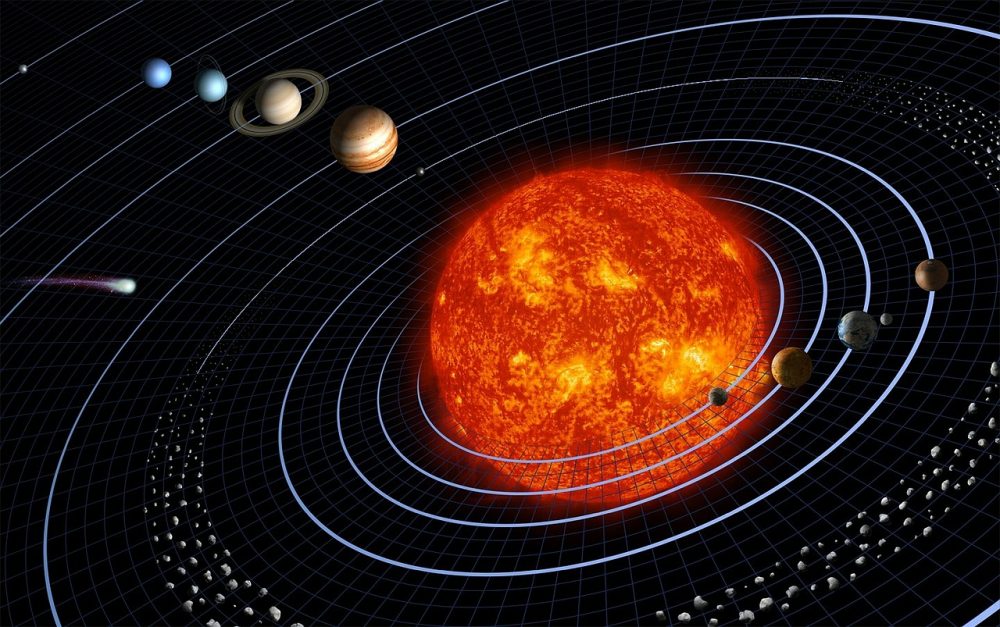
Why space research? The universe is replete with worlds apart from the planet earth. From our historical ancestors discovering fire to modern man exploring space, inquisitiveness has been vital to the innovation and exploration of our universe, and the survival and advancement of the human species. Space science has become increasingly popular over the years. With the study of outer space and space discoveries piling up by the day, it is essential to be able to write an essay on space. Writing on any topic about space will require that you are abreast of the latest space discoveries.
Writing a space essay would require that you have a working knowledge of other types of essays that we have described in our previous posts. For example, knowing how to write a descriptive essay will help in an article on the study of objects in space, while knowledge of how to write an argumentative essay will come in handy when writing an essay on controversial space topics. If you’re not sure you can do all this on your own, get college thesis writing help .
Coming Up With Great Space Topics
Space race topics, space research topics, space exploration topics, space topics for presentation, controversial space topics, earth and space science topics, astronomy research paper topics, astronomy essay topics, space arguable research topics, space science investigative essay topics.
Before writing an article on space study, you need to choose the right space topic. Choosing appropriate space topics is critical to the success of your space essay as the right topic will give you the luxury of a better flow of ideas. For this reason, we have crafted 80 topics about space that will make writing a space essay easy. You can never get bored while working on these interesting space topics because you will learn to explore and study space as you’ve never done before. These 80 cool space topics will come in handy in any space essay you plan to write.
Writing a space race essay is an excellent place to start if you want to explore the events that lead to the explosive growth of the space industry. The space race was a competition between the United States and the Soviet Union to attain the capability of space flight from the period of 1955 to 1975. If you’re interested in going back in time to tell these space stories uniquely, these space race topics will surely land you on the moon!
- The 1955 Space Race: Its Pros and Cons on the Rival Countries.
- The 1955 Space Race: Its Enduring Impact on Modern Space Technology and Travel.
- The 1955 Space Race: A Battle for Supremacy.
- How the Space Race Transformed America.
- The 1955 Space Race: The reason the Soviet Union lost to the USA.
Space research has become popular over the last decades. It is an extensive research field that seeks to study outer space scientifically. Research topics about space are relatively easy to find considering the broad research areas, which include: Earth observations, Geodesy, Atmospheric Sciences, Space physics, Planetology, Astronomy, Materials sciences, Life sciences, and Physics. Space research paper topics must stimulate and birth inquiry and answer compelling questions. Are you ready to get on the space shuttle? Here are some space research topics to help you!
- 2000 – 2010: A successful Decade in Astronomy?
- The Theory of Relativity in Space.
- UFOs and Extraterrestrials: Fact or Fiction?
- Space Colonization: Reasons, Goals, and Methods.
- Big Bang Theory: The Birth of the Universe?
Space exploration is the investigation of outer space with the use of space technology and astronomy. While the study of space is carried out mainly by astronomers with telescopes, its physical exploration is carried out by both robotic space probes and human spaceflight. Writing a space exploration essay opens your imagination to the wonders of outer space. You sure need to be ready for the unexpected! Here are some space exploration topics to whet your adventurous appetite!
- The Need for Continuous Space Exploration.
- Space Exploration: Differences between the then and now.
- Space Exploration: Its Importance to the Knowledge of the Earth and Universe.
- Space Exploration: Operations and Future Exploration Plans.
- The Importance of Unmanned Space Exploration.
Giving a presentation or seminar on space could be quite dicey. It requires that you can make complex phenomena appeal to the mind of your listeners. To be able to do this, you need to have a considerable amount of knowledge in any of the space science topics that you choose. A tip will be to choose topics that your audience will easily relate to, prepare adequately, and remember that you’re communicating with earthlings. Here are some space topics for a presentation that will earn you the respect of the extraterrestrials!
- The Earth and Universe.
- Getting the Big Picture from the Study of Dwarf Galaxies.
- History of Astronomy: A scientific Overview.
- What Exists in Space beyond our Solar Neighborhood.
- Future Space Missions: A look into what they should be.
Something as big as space study does not come without its controversies. Space exploration and travel are not without their risks and benefits. Many believe that robots, instead of humans, should man shuttles for space travel because of the risk space travel poses to humans. Many people also see space study as a sheer waste of time and resources and think it better to channel these vast amounts of money to more critical areas like health and education. All these different views and more, are what make space study a controversial topic. Here are some controversial space topics that will give you a hang of what to discuss in a space-related debate. Some of these topics could also be helpful in a space travel essay.
- Space Travel: At the Expense of our Health, Earth, and Future?
- Space Travel: A thing for Robots or Humans?
- Space Research: A Pointless Adventure and Waste of Resources?
- Earth and the Search for Other Habitable Planets.
- Science Versus Religion: The Big Bang?
Earth and Space Science or ESS, for short, connects systems by exploring the interrelationships between the land, atmosphere, ocean, and life on Earth. These include the water cycle, carbon cycle, rock cycle, and other materials that continually influence, shape, and sustain the earth. Here are some new earth and space science topics just for you!
- The Interactions between Weather and Climate.
- The Process of Rock Formation and Erosion.
- Plate Tectonics: An In-depth Exploration.
- Natural Catastrophes: Its consequence on the Ecosystem.
- The Moon and Sun: Effects on Ocean Tides.
There are two fields of study in carrying out astronomical research – the observational and theoretical fields of astronomy. Observation primarily deals with the study and monitoring of actual celestial objects in space like stars, planets, moons, and asteroids.
Theoretical dwells more on creating and studying models of astronomy that cannot be observed and haven’t been properly seen. Some astronomy research paper topics include;
- What happens during a solar eclipse?
- What are the major factors responsible for the solar eclipse?
- What should you expect during a lunar eclipse
- What lies beyond our visible universe
- Light and its dimension in space
- The lunar cycle – how does it function?
- Understanding solar system, sun, and the planets
- What is astrophysics?
- What are the different grand unification theories?
- The latitude and longitude of the earth.
- Fast mode, slow mode, and nonlinear effects
Celestial bodies like the sun, moon, other planets, and relatively closer objects in space are examined and comprehensively written upon under astronomy. Examples of astronomy essay topics include;
- How our planet came to exist
- How solar flares occur
- Our solar system, in broad view
- The effect of the moon on our oceans
- How stars are born
- What are the different types of stars in existence?
- Understanding molecular cloud
- How does the universe accelerate?
- Understanding cosmic acceleration and galaxy cluster growth
- Hubble constant and dark energy theories
- Formation, evolution, and destruction of clouds in galaxies
- What is the meridian and transit circle?
The mystery of what occurs inside a black hole is still up for debate, and so are other astronomical events. These form the bulk of space arguable research topics, which discuss things yet to be fully understood. Some space arguable research topics include;
- What is truly beyond the Milky Way?
- What is antimatter?
- Why does space keep expanding?
- How long does it take to travel the space?
- The physics behind a black hole.
- Is earth the most prominent of all the planets?
- How do people who live on other planets survive?
- Is Pluto an official planet or not?
- Should the journey to Mars be opened to everyone?
- What do astronauts eat while in space?
- Is Pluto a dwarf planet?
- A detailed analysis of the 2012 transit of Venus
- What are the best defenses against killer asteroids?
- Interplanetary matter and how to relate it to space activities.
Space is so vast and mysterious that there’s a lot to uncover with events to monitor and investigate. Creating agencies like NASA and the first mission to the moon was born out of curiosity about our place in this vast universe. Some space science investigative essay topics you could present include;
- How does the sun affect our water bodies?
- Where do asteroids come from?
- Molecular Cloud: Molecules, Properties, and Distribution
- How do solar systems with two stars operate?
- Is there an earth-like planet in the nearest solar system?
- Would we ever discover aliens?
- Conducting exoplanet research
- What is interstellar extinction?
- What are the essentials needed for space travel?
- Beyond this realm – understanding extraterrestrial life.
- What is a deep impact mission?
- Understanding the structure of the solar chromosphere.
- An analysis of the Wilson-Bappu effect
- What is a color index?
So here we are! 80 awesome space topics absolutely for free! Hopefully, you’ve got the perfect topic for your assignment or project. Keep shining like the star that you are! If you need more ideas, please check the following graduate project ideas .
Leave a Reply Cancel reply
Research Topics List
JPL's charter is to conduct robotic space missions for NASA, to explore our own and neighboring planetary systems, understand the origin and evolution of the universe and make critical measurements to understand our home planet and help protect it. We do this by developing integrated capabilities in engineering, science and technology, in a unique environment that strives for excellence in any of the three areas. To be successful in our ability to implement missions for NASA, we foster research in those areas of space-based science that establish our leadership in the science community and those technologies that allow the innovations that are crucial to maintaining our competitive edge. Our science, technology and engineering research covers many areas of planetary, astrophysics and Earth science, both as basic research leading to new observations and mission concepts, as well as research based on the data acquired by JPL flight projects. Our technology research covers areas ranging from robotic systems, a range of in-situ and remote sensing instruments, deep space communications and navigation, information systems, precision flying and planetary protection and survivability.
- From the Director
- Values and Code of Conduct
- Equity and Inclusion
- Annual Reports
- Scientific Staff
- Postdoctoral Fellows
- Graduate Students
- Research Professionals
- Institute Staff
- Cosmic Structure
- Extreme Astrophysics
- Physics of the Universe
- Stellar, Interstellar and Planetary Astrophysics
- Research Interests of Senior Members
- Publications
- Events Calendar
- Upcoming Events
- Astrophysics Colloquium
- Cosmology Seminar
- Public Lectures
- Opportunities
- Postdoctoral opportunities
- Prospective Graduate Students
- Post-baccalaureate Fellowship
- Undergraduate Research
- Request a Tea Talk
- Getting Here
- Lecture Archive
- Latest from KIPAC
- Research Highlights
- In the News
- Newsletters
- New to the KIPAC Community?
- COVID Protocols
Research topics
Astrophysical magnetism and the interstellar medium.

What fills the space between the stars? In addition to stars, planets, and dark matter, galaxies are home to vast reservoirs of gas and dust, high-energy particles, and magnetic fields. This is the interstellar medium (ISM): the stuff between the stars. The interstellar medium is the material from which new stars are born.
Black Holes

Cosmic Microwave Background

Dark Energy

One of the most important and surprising scientific discoveries of the twentieth century is that the expansion of space is not slowing down, but speeding up—contrary to what we expect the gravitational pull of all the matter in the Universe to do. The driver of this accelerating expansion has been labeled "dark energy," but there is much about the phenomenon that researchers don’t understand.
Dark Matter

First Stars and Galaxies

Roughly 400,000 years after the Big Bang, the Universe—bathing in the afterglow of radiation that we see today as the cosmic microwave background—began to enter the cosmic “dark ages,” so named because the luminous stars and galaxies we see today had yet to form.
Galaxy Clusters

Galaxy Formation

Gravitational Lensing

Neutron Stars and Pulsars

Optical Surveys

In the traditional model of astronomical observation, individual or small teams of astronomers study a select class of objects in a small region of sky. However, some of the most exciting cosmological and astrophysical results in recent years have required the study of millions of galaxies over thousands of square degrees of sky.
Particle Acceleration

Scientific Visualization and Data Analysis

KIPAC's visualization and data analysis facilities provide hardware and software solutions that help users at KIPAC and SLAC to analyze their large-scale scientific data sets.
Solar Physics

Thank you for visiting nature.com. You are using a browser version with limited support for CSS. To obtain the best experience, we recommend you use a more up to date browser (or turn off compatibility mode in Internet Explorer). In the meantime, to ensure continued support, we are displaying the site without styles and JavaScript.
- View all journals
Space physics articles from across Nature Portfolio
Space physics is the study of the natural phenomenon that occur in our solar system. Specifically, the sun, the particles and radiation it creates and how these affect the planets. This includes the solar wind and its interaction with the Earth and near-Earth space; so-called space weather.
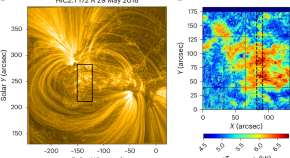
High-resolution observations and numerical simulations provide insight into solar atmospheric heating
What mechanisms power the heating of the solar atmosphere is a long-standing, complex question. Satellite and sounding-rocket observations, coupled with computer simulations, now support the idea that dissipation of electrical currents causes strong heating in the brightest parts of the solar chromosphere and corona.
Related Subjects
- Astronomical instrumentation
- Magnetospheric physics
- Solar physics
Latest Research and Reviews
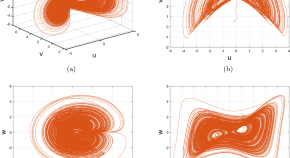
Enhancing the trustworthiness of chaos and synchronization of chaotic satellite model: a practice of discrete fractional-order approaches
- Saima Rashid
- Sher Zaman Hamidi
- Yu-Ming Chu

Near-collapse of the geomagnetic field may have contributed to atmospheric oxygenation and animal radiation in the Ediacaran Period
An ultra-weak magnetic field from Earth’s core lasting for at least 26 million years may have contributed to Earth’s oxygenation and further diversification of the Ediacaran fauna, according to single-crystal paleointensity data from igneous rocks in South Africa and Brazil.
- Wentao Huang
- John A. Tarduno
- Michael K. Watkeys
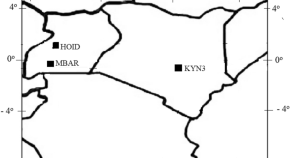
Performance of IRI 2016 model in predicting total electron content (TEC) compared with GPS-TEC over East Africa during 2019–2021
- Emmanuel D. Sulungu
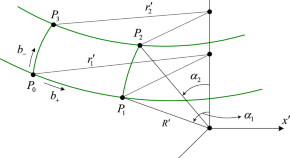
Relativistic analysis of the Michelson-Gale experimental result
- Yang-Ho Choi
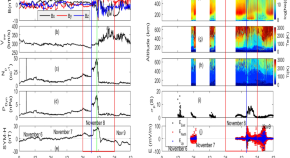
Enhanced response of thermospheric cooling emission to negative pressure pulse
- Tikemani Bag
- Yasunobu Ogawa
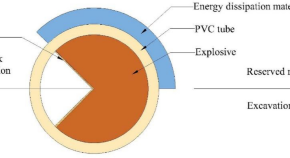
Experimental research and application of drilling and blasting with directional damage-reduction shaped charge
- Kaixing Liu
- Yi ping Zhang
News and Comment
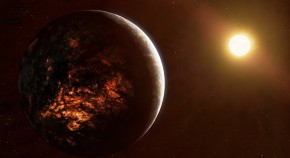
‘Milestone’ discovery as JWST confirms atmosphere on an Earth-like exoplanet
55 Cancri e is too hot to support life as we know it, but could provide clues about Earth’s formation.
- Sumeet Kulkarni

Living on Mars would probably suck — here's why
Kelly and Zach Weinersmith join us to discuss their book A City on Mars: Can We Settle Space, Should We Settle Space, and Have We Really Thought This Through?
- Benjamin Thompson
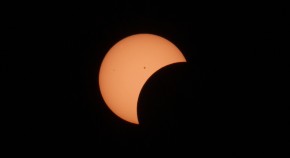
Total solar eclipse 2024: what dazzled scientists
Amateur and professional astronomers share with Nature what they observed and what data they collected when the Moon blocked the Sun.
- Lauren Wolf

Total solar eclipse 2024: how it will help scientists to study the Sun
The Sun’s mysterious outer atmosphere, the corona, will become easier to view from Earth on 8 April.
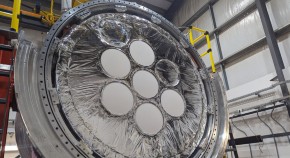
‘Best view ever’: observatory will map Big Bang’s afterglow in new detail
The Simons Observatory will search for signs of gravitational waves that originated from the Big Bang.
- Davide Castelvecchi
Quick links
- Explore articles by subject
- Guide to authors
- Editorial policies

- May 10, 2024 | Revolutionary Battery Tech Promises Less Charging Time, More Energy Storage
- May 10, 2024 | Quantum Entanglement Unmasked by Entanglement Witnesses
- May 10, 2024 | Innovative Study Reveals How Addiction Hijacks Brain Functions
- May 10, 2024 | New Research Could Lead to More Efficient Televisions, Computer Screens and Lighting
- May 10, 2024 | How Satellite Technology Is Rewriting Tiger Conservation
Find all the latest space news right now on SciTechDaily, your ultimate gateway to the cosmos and its countless wonders. We provide you with up-to-date information on the latest discoveries, innovations, and research in space exploration, astronomy, and astrophysics.
Our expertly curated content covers a diverse range of topics, from the mysteries of black holes and exoplanets to advancements in space technology and international space missions. Join us as we venture beyond Earth’s boundaries, delving into the secrets of the universe and uncovering the groundbreaking achievements that continue to push the limits of human knowledge and ingenuity.
Embark on an interstellar journey of discovery and inspiration with SciTechDaily. Discover the current news on space exploration, astronomy, astrophysics, cosmology, and more out of places like NASA, JPL, ALMA, and ESA. View incredible new space images from sources like Hubble, Kepler, James Webb space telescopes. Hot sub-topics include Astronomy , NASA , Astrophysics , Black Holes , Cosmology , Exoplanets , Hubble , Goddard Space Flight Center , Mars , Cassini-Huygens , James Webb Telescope , Juno , Gravitational Waves , ESA , and Dark Energy .
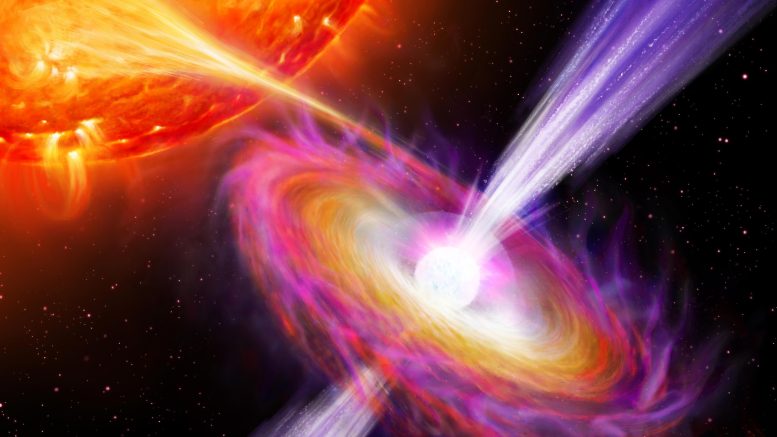
Space May 10, 2024
“Cosmic Cannibals” – Astonishing Speeds of Stellar Jets Unveiled for the First Time
Astronomers have successfully measured the velocity of rapidly moving jets in space for the first time, a critical factor in the formation of stars and…

Beyond the Brink: New NASA Black Hole Visualization Plunges Viewers Into the Event Horizon

Solar Stormwatch: NASA Catches Intense X1.1 Flare in Action

Supermassive Spectacle: Hubble Captures a Galaxy With a Voracious Black Hole

On the Radar: Can We Detect Doomsday Asteroids in Time?
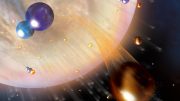
Chemical Culprit Identified: Scientists Discover Why “Earth’s Twin” Has Almost No Water
Solar fury unleashed: twin x-class flares light up the sky.
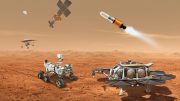
Will SpaceX’s Innovation Save NASA’s Mars Mission?
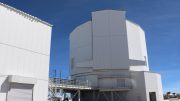
A Better View of the Universe: World’s Highest Observatory Opens
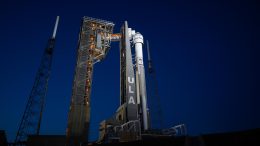
Space May 8, 2024
Faulty Atlas V Valve Leads to Rescheduling of NASA’s Boeing Starliner Crew Flight Test
NASA’s Boeing Crew Flight Test to the International Space Station has been postponed to no earlier than May 17 due to a faulty valve in…

Space May 7, 2024
Did the Webb Telescope Find Alien Life on Exoplanet K2-18b? Here’s What We Know
Recent research finds claims of biosignature gas detection were premature. Recent reports of NASA’s James Webb Space Telescope finding signs of life on a distant…
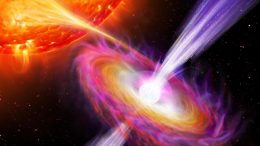
Integral Space Telescope Spots Massive Nuclear Explosions Feeding Neutron Star Jets
ESA’s gamma-ray space telescope Integral has played a decisive role in capturing jets of matter being expelled into space at one-third the speed of light….
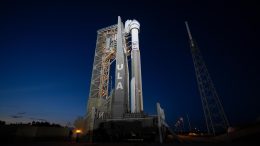
NASA’s Boeing Starliner Crew Flight Test Scrubbed Due to Unexpected Valve Glitch
NASA, Boeing, and United Launch Alliance scrubbed the launch opportunity on Monday, May 6 for the agency’s Boeing Crew Flight Test to the International Space…
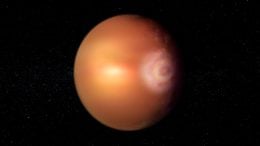
Space May 6, 2024
From Inferno to Rainbow: Discovering WASP-76b’s Atmospheric Marvel
For the first time, potential signs of the rainbow-like ‘glory effect’ have been detected on a planet outside our Solar System. Glory are colorful concentric…

Stellar Graveyard Secrets: Astronomers Solve White Dwarf Heavy Metal Mystery
Recent research reveals that white dwarfs consume nearby planetesimals due to a “natal kick” during their formation. This dynamic alteration affects their motion and the…
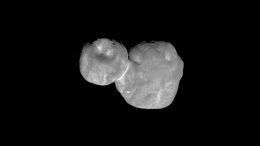
New “Space Snowman” Discovery Shakes Up Solar System Theories
A recent study exploring the development of comets suggests that objects in deep space, such as the Kuiper Belt Object 486958 Arrokoth, might act as…
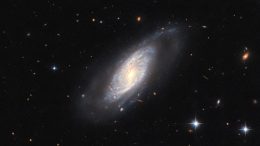
Galactic Wonders: Hubble Explores a Supernova Factory
Located 240 million light-years away, UGC 9684 is recognized for its regular production of supernovae and new stars, earning the spotlight in recent Hubble observations…
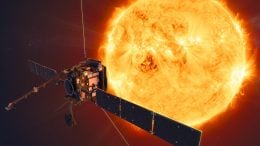
Space May 5, 2024
Solar Orbiter Captures the Sun’s Fluffy Corona in Stunning Detail [Video]
Stunning close-up views of the Sun reveal its dynamic magnetic structures and extreme temperatures, captured by ESA’s Solar Orbiter in collaboration with NASA’s Parker Solar…
Latest News

Watch monster flare-spewing sunspot grow to be 15 times wider than Earth (video)
By Meredith Garofalo published 10 May 24
A beastly sunspot that's 15 times the diameter of Earth remains highly active — and you might be able to spot it with your eclipse glasses!

Cracking! Some binary black holes may roll around each other in egg-shaped orbits
By Robert Lea published 10 May 24
Some black hole pairs roll around each other in wobbly, egg-shaped orbits that could hold clues about their origins, gravitational wave measurements suggest.
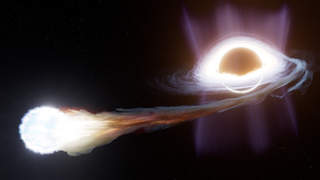
NASA's Roman Space Telescope will hunt for the universe's 1st stars — or their shredded corpses, anyway
NASA's Nancy Grace Roman Telescope will hunt for the universe's first stars — or rather, what's left of them after they've been ripped apart by black holes.
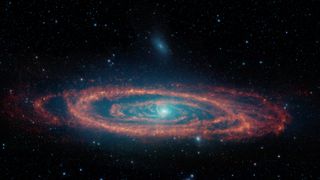
Our neighboring galaxy's supermassive black hole would probably be a polite dinner guest
By Sharmila Kuthunur published 10 May 24
Astronomers find multiple streams of dust spiraling into the heart of the nearby Andromeda galaxy, where a supermassive black hole lurks.

How to watch new 'Doctor Who': Stream Ncuti Gatwa episodes from anywhere
By Richard Edwards published 10 May 24
How to watch new 'Doctor Who' on Disney Plus and BBC iPlayer, as 15th Doctor Ncuti Gatwa takes control of the TARDIS.
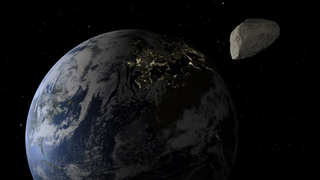
'God of Destruction' asteroid Apophis will come to Earth in 2029 — and it could meet some tiny spacecraft
Asteroid Apophis is heading to Earth, and scientists have revealed three tiny spacecraft concepts that could race to meet the space rock in April 2029.
Asteroid that exploded over Berlin was fastest-spinning space rock ever recorded
By Sascha Pare published 10 May 24
Scientists have calculated the rotational speed of asteroid 2024 BX1, which exploded over Berlin earlier this year, by letting it trail in images of the sky. It turns out, 2024 BX1 was spinning faster than any other near-Earth object ever seen.

FAA to conduct new environmental review for SpaceX's Starship operations in Florida
By Mike Wall published 10 May 24
The FAA announced May 10 that it will prepare an environmental impact statement for SpaceX's planned work with Starship at NASA's Kennedy Space Center in Florida.
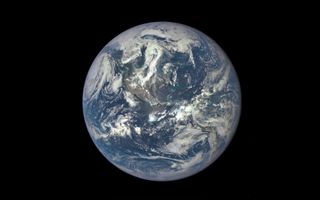
Science and music festival Starmus VII is about to rock Bratislava with a stellar lineup
By Daisy Dobrijevic published 10 May 24
The Starmus music and science festival heads to Bratislava, Slovakia for a multi-day event from May 12 to May 17. Here's what to expect.
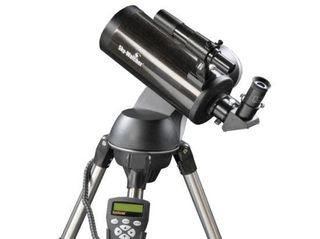
Sky-Watcher telescope deals 2024
By Gemma Lavender last updated 10 May 24
DEALS We've found the best Sky-Watcher telescope deals for you.
Get the Space.com Newsletter
Breaking space news, the latest updates on rocket launches, skywatching events and more!
- 2 NASA's Roman Space Telescope will hunt for the universe's 1st stars — or their shredded corpses, anyway
- 3 Our neighboring galaxy's supermassive black hole would probably be a polite dinner guest
- 4 'God of Destruction' asteroid Apophis will come to Earth in 2029 — and it could meet some tiny spacecraft
- 5 Asteroid that exploded over Berlin was fastest-spinning space rock ever recorded
Writing papers doesn't always come easy, ordering essays from us does.
My Paper Writer
154 Astronomy Research Topics: Rocket To Your Marvelous Grades

Every student knows that the key to writing an excellent research assignment starts with choosing an interesting topic that captures the reader’s attention and explores new areas within the discipline. Some research topics come to students naturally, but often coming up with a good topic to research and write about can be difficult. This article provides 154 of the best astronomy topics for college and university students. They cover a variety of areas and are sure to impress even the toughest professors.
Table of Contents
What is astronomy, characteristics of a good research paper, astronomy research topics for all levels, easy astronomy research paper topics, a set of interesting astronomy topics, great astrophysics research topics, great research topics in cosmology, excellent space exploration topics.
Astronomy is a branch of natural science that deals with celestial objects, space, and the physical universe as a whole. Students use a combination of mathematics, physics, and chemistry to explain the origins and evolution of planets, stars, nebulae, galaxies, and comets. Ancient civilizations made observations and measurements of the night sky, making astronomy one of the oldest natural sciences.
A great research paper in any subject should meet common criteria. The work that goes into conducting research should be systematic, logical, tangible, replicable, and comprehensive. All of this requires an in-depth literature review and background data. The five characteristics a teacher or professor in any class would expect:
- Specific – A research paper should focus on a central question or issue in which a problem is clearly defined.
- Measurable – The information used to form an opinion related to the central question should be open to analysis and evaluation.
- Attainable – The information should also be available to other researchers for verification and review.
- Realistic – The opinion formed based on the information cannot be manipulated or modified to fit a hypothesis or theory.
- Formatting – A research paper should follow a specific format (e.g., APA or MLA) and be fully edited and proofread.
Whether or not you have a five-page paper or a twenty-page paper due, our expert writers and editors have scoured the net to find great topics for your consideration. These are completely free to use and modify in any way to suit your specific assignment needs. Teachers will be impressed with any of these cool astronomy topics which will improve your chances of earning a high score on your next assignment. However if you don’t want to go through the writing process yourself, you can always hire experts to write research papers for money .
These astronomy topics to write about are great when you don’t have the time or resources to conduct in-depth research. You can generally find a lot of information on the web and can find trustworthy sources at the library without having to request items through interlibrary loan:
- Will we find evidence of water on Mars?
- Are any planets in our Solar System habitable?
- What are the biggest differences between the inner and outer planets?
- Are any of the giant moons habitable?
- What are dwarf galaxies and what role do they play?
- What have we learned about Haley’s comet and its composition?
- How does the moon affect the Earth’s oceans?
- What does the Hubble telescope show us about the distant universe?
- What do we know about how planets formed in our galaxy?
- Why is the study of comets so important?
- How does astronomy help us measure time?
- How do constellations help determine the age of the Universe?
- What are the fundamentals of astronomy?
- How was our solar system formed?
- What impact does space debris have on the Solar System?
- How does the moon affect the Earth’s gravity?
- How do neighboring galaxies affect the Milky Way?
- What impact does the Sun have on climate change?
- What can we learn from clusters of galaxies?
- What are black holes and why should we worry?
- Why did the Catholic Church feel challenged by Newton?
- How did ancient civilizations utilize astronomy?
- What do we know about the life cycles of stars?
- How does the moon affect the Earth’s weather?
- What impact did Isaac Newton have on astronomy?
- How much influence did the early astronomers have on our understanding of space?
- How have humans affected the solar system?
- What is the Great Crunch in astronomy?
- What lies beyond the Milky Way?
- Why is Pluto a controversial planet?
- How have science fiction writers influenced astronomy?
If you are looking toward going into the field of astronomy, you will have to have a strong background in all things related to the discipline. These interesting space topics cover a broad range of questions you can explore. All the space science topics listed here will challenge you to conduct ample research:
- How accessible is Stephen Hawking’s research work?
- Can a black hole destroy the Milky Way?
- How influential is Hawking’s “A Brief History in Time”?
- Which method for detecting exoplanets is the most effective?
- How does the Sun impact the way major bodies of water move on Earth?
- What causes solar and lunar eclipses?
- How did heavenly bodies influence early mythologies?
- What purpose do black holes serve?
- What are the differences between the Copernicus and Heliocentric models?
- What do the rings of Saturn tell us about the planet’s composition?
- What are the origins of our solar system?
- How does the Moon’s orbit around Earth affect climate?
- How can we better understand the relationship between space and time?
- How fast are we moving when we stand still?
- How do zero-gravity conditions affect humans?
- What are the differences between dark energy and dark matter?
- What lies between the Milky Way and Andromeda?
- Are there any future business opportunities in space?
- Why does the Moon orbit around the Earth?
- What are the different views of interstellar space?
- Can life exist outside of the Solar System?
- What would first contact mean for the human race?
- How do sunspots affect the weather on earth?
- Why is it important to learn astronomy in college?
- How did the Sun form and how old is it?
- How do humans interpret constellations?
- How many galaxies are known to humans?
- What happens when galaxies collide?
- What is the most effective way to determine angular diameter in space objects?
- What do we understand about the universe’s age?
- What is the likelihood that the Earth could be hit by an asteroid?
The astronomy project topics listed here require you to employ the methods and principles of physics and chemistry to explain the birth of celestial objects and the universe. You will need to conduct a lot of in-depth research using scientific resources to tackle these astrophysics research topics:
- What are the differences between dark matter and dark energy?
- What role does philosophy play in astrophysics?
- How do celestial objects affect seasonal change on Earth?
- How did astrophysics change the way we look at the relationship between celestial objects?
- Where do twin stars originate from?
- What are the differences between black holes and quasars?
- What are the most important questions astrophysics answers?
- What can be understood about the death of a star?
- What are some of the major controversies in astrophysics?
- What are the differences between black-body radiation and thermal equilibrium?
- What are the basic properties of giant stars?
- What has astrophysics taught us about the lifespan of stars?
- How is an accelerating universe affected by dark matter?
- What contributions did the Kepler mission make to astronomy?
- How is stellar evolution measured using the HR diagram?
- Why do black holes remain dormant for thousands of years?
- Are there dangers with the Hadron Collider experiments?
- Can we view dead stars before they turn into black holes?
- How is radiative transport affected by gas emissions?
- What are the best theories supporting time travel?
- What do we know about the origins of the Milky Way?
- What are the astrophysical implications of black holes?
- How can we measure the size of a black hole?
- What are wormholes and what do they tell us about space travel?
- When do black holes begin to consume matter?
- What are the origins of astrophysics?
- How does astrophysics help us understand time travel?
- How has quantum physics helped us understand the universe?
- How can we better understand nebulae and masses of matter?
- What are the implications of the speed of light travel?
- How will the Sun’s evolution affect Earth?
Unlike the other astronomy paper topics we have listed, cosmology deals with the beginnings of the universe. The dominating theory is the Big Bang, but there are other schools of thought that can be considered controversial but certainly pique readers’ interests. Here are some great astronomy topics for research paper to think about:
- What is the Big Bang Theory?
- What is the current research landscape of string theory?
- What role does dark matter play in measuring the universe’s expansion?
- In what ways has mythological cosmology changed over the years?
- What is the difference between dark energy and dark matter?
- What is dark matter and what does it tell us about the universe’s origins?
- What causes eternal inflation in the string theory landscape?
- What has the COBE revealed about the universe’s origins?
- What are the gravitational waves and signatures of the early universe?
- What are the main characteristics of string theory?
- What do we know definitively about the origins of the Universe?
- What does the Hubble eXtreme Deep Field tell us about the furthest galaxies?
- How does the cosmic microwave background help us understand origins?
- Why is dark matter important to our understanding of the universe?
- What do scientists believe lies beyond the Milky Way?
- How does the size of the Universe tell us about its beginnings?
- How does dark energy interact with interplanetary objects?
This is one of the most important areas of astronomy because it deals with technologies used to carry out physical exploration done by both manned and unmanned spacecraft. Some of the space research paper topics listed here deal with the history of exploration, while the rest deal with current and future missions:
- What did we learn about the Challenger disaster?
- Why were the moon missions so important for space exploration?
- Is space exploration a philosophical question that needs answers?
- How did the moon explorations help us understand how the Earth was formed?
- Why are Musk’s Starlink technologies important for space travel?
- Why were the Apollo missions important for NASA’s survival?
- What are the major advancements in space exploration over the last 10 years?
- Is space exploration necessary and what are its ramifications?
- Should governments continue to use funds to pay for space exploration?
- What elements exist beyond the known universe?
- How did the space race change international politics?
- How have manned space flights changed over the decades?
- What are some of the challenges the Apollo 11 mission faced?
- Can space exploration lead to medical advancements?
- What are the benefits of space exploration?
- Will we ever colonize other planets in our Solar System?
- What are the challenges of space exploration for third-world countries?
- Should the U.S. government invest in a Mars manned mission?
- Why impact did the space race have on the Cold War?
- What does the future hold for NASA and space exploration?
- How can we optimize exercise for extended human space flight?
- What are the possibilities of colonizing the moon?
- Should funding space missions be a government priority?
- How does spaceflight affect bone density in astronauts?
- How likely is a manned mission to Mars in the next decade?
- How does spaceflight affect brain function in astronauts?
- What are the challenges international agencies face with space exploration?
- What are the challenges of colonizing other planets?
- What are the challenges and opportunities of biology in space?
- What impact has space debris had on space exploration?
- Why is space exploration so important?
- What role do robots play in space exploration?
- What are some of the current technologies for the detection of life?
- What role did the Apollo missions have on space exploration?
- How can deep space satellites be used to study exoplanets?
- What role does the international space station have on deep space exploration?
- What are the possibilities of finding life on other planets?
- What impact do space environments have on algae and cyanobacteria?
- What is the possibility of finding cures for diseases in space?
- How important is AI in space exploration?
- How does spaceflight affect creative performance?
- What impact did the Mercury missions have on the space race?
- What are the most important space breakthroughs in history?
- What impact will Elon Musk’s contribution to space travel have?
Need Someone to Write Your Paper?
As we mentioned above, a good research paper requires a lot of preparation and several days (sometimes weeks) of hard work. For a variety of reasons, many students are not able to complete a research project on their own and look toward outside assistance to get their work done.
We are a paper writing service that provides end-to-end help writing college papers for students at all levels. Our professionals are all native English speakers and writers that have earned advanced degrees in a variety of disciplines and have undergone extensive testing to ensure they deliver custom high-quality work. Unlike many other online services, we work fast and deliver assignments that earn students the highest scores for cheap prices. Our secure payment system Contact our trustworthy team by chat, email, or phone 24 hours a day year-round and let us show you how we can help you succeed.
189 Social Media Research Paper Topics To Top Your Paper

Social media has been around since the late 1990s and refers to the means of interaction and communication between groups of people from all over the world. It allows them to create, share, and exchange information, ideas, and conversations in virtual communities over the internet. Society embraced social media and it was made popular by individuals that wanted to connect with others but quickly became a tool used by businesses and organizations to promote products and services and is now a vital component in building relationships, broadcasting, and marketing at small- and large-scale levels.
- Different Types Of Social Media
- What Goes Into The Structure Of Great Social Media Paper
- Excellent Social Media Research Topics
- Easy Research Topics About Social Media
- Research Papers On Social Media For College
- Social Networks Topics For Graduate Students
- Popular List Of Social Networks Topics For 2023
I requested the editor as I wanted my essay to be proofread and revised following the teacher’s comments. Edits were made very quickly. I am satisfied with the writer’s work and would recommend her services. I requested the editor as I wanted my essay to be proofread and revised following the teacher’s comments. Edits were made very quickly. I am satisfied with the writer’s work and would recommend her services.
Leave a Reply Cancel reply
Secure the top grades, with vetted experts at your fingertips.
- How It Works
- PhD thesis writing
- Master thesis writing
- Bachelor thesis writing
- Dissertation writing service
- Dissertation abstract writing
- Thesis proposal writing
- Thesis editing service
- Thesis proofreading service
- Thesis formatting service
- Coursework writing service
- Research paper writing service
- Architecture thesis writing
- Computer science thesis writing
- Engineering thesis writing
- History thesis writing
- MBA thesis writing
- Nursing dissertation writing
- Psychology dissertation writing
- Sociology thesis writing
- Statistics dissertation writing
- Buy dissertation online
- Write my dissertation
- Cheap thesis
- Cheap dissertation
- Custom dissertation
- Dissertation help
- Pay for thesis
- Pay for dissertation
- Senior thesis
- Write my thesis
170 Fantastic Astronomy Topics For High Scoring Thesis
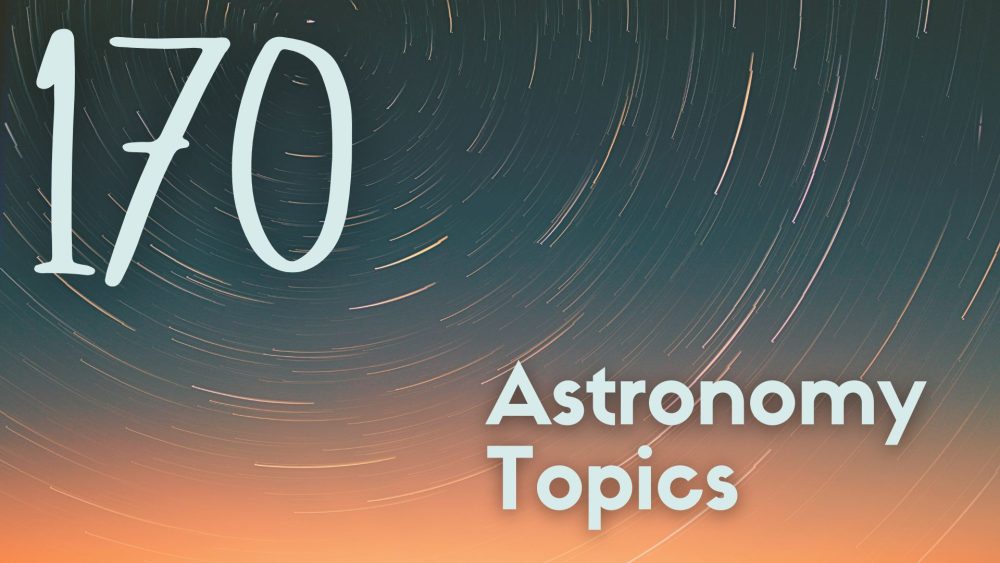
Astronomy, which is the study of celestial objects and phenomena, has indeed captured the imaginations of humanity since time immemorial. From unraveling the mysteries of distant galaxies to investigating the nature of dark matter, astronomy, interestingly, indeed encompasses a wide range of exciting research topics.
But before we look at a wide range of excellent astronomy-related research topics that college students, professors, teachers, and other professionals will find useful, let us take a small detour to what astronomy really is.
What Is Astronomy?
Astronomy is the scientific discipline that essentially focuses on the study of celestial objects such as stars, planets, galaxies, and other phenomena in the universe. In other words, astronomy is the observation, theoretical modeling, and interpretation of astronomical data for the purposes of deepening our understanding of the cosmos.

Characteristics Of A Good Astronomy Research Paper
Here are some characteristics of a good astronomy paper:
Originality : A good astronomy research paper should provide unique insights and be able to address unanswered questions.
Clarity : A good astronomy research paper should be able to simplify and communicate complex concepts effectively.
Scientific-rigor : A good astronomy research paper should be able to present a well-defined methodology and provide reliable data.
Relevance : A good astronomy research paper should be relevant. It should be able to explore emerging areas of study or address current astronomical issues.
Contribution : A good astronomy research paper should be able to advance existing knowledge and provide avenues for further research.
Astronomy Research Topics
Astronomy research topics, in a nutshell, encompass various research areas within astronomy. These research areas include but are not limited to: the study of gravitational waves, extraterrestrial intelligence, magnetic fields in celestial objects, stellar evolution, and high-energy astrophysics. Here are great astronomy research topics to consider for your school or university paper:
- Gravitational waves and their impact on Astronomy
- Stellar evolution and life cycle of stars
- The role of magnetic fields in shaping celestial objects
- The role of magnetic fields in star formation
- Origin and evolution of supermassive black holes
- Impact of Space weather on Earth’s atmosphere
- Investigating the nature of fast radio transients
- Evolution of galaxies in different environments
- Probing the intergalactic medium using quasar absorption lines
- Cosmic rays and their effects on astronaut health
- Detection and characterization of fast radio bursts
- Study of Exomoons: Moons orbiting exoplanets
- High energy astrophysics and cosmic rays
Astronomy Topics
These topics cover a wide range of astronomical subjects such as galaxies and their evolution, planetary atmospheres, the study of asteroids and comets, phenomena like gamma-ray bursts, and the formation of the solar system to mention a few. Students who need dissertation help will find the following topic suggestions interesting:
- The formation of the solar system
- Exploring the mysteries of gamma-ray bursts
- Planetary atmospheres and climate change
- The study of asteroids and comets
- Types, interactions, and evolutions of galaxies
- Stellar populations in different galactic environments
- Dynamics and formation of globular clusters
- The role of black holes in galaxy evolution
- Exploring the cosmic microwave background radiation
- Probing the origins of ultra-high energy cosmic rays
- The formation and evolution of planetary nebulae
- Investigating the origins of First Radio Bursts (FRBs)
- The interstellar medium and star formation
Space Research Paper Topics
These focus on topics related to space exploration and observations. Some high-quality interesting topics that native writers, students, and class teachers will find useful include:
- Space telescopes and their contribution to astronomy
- The study of space weather and its effects on earth
- Investigating the mysteries of black holes using space-based observatories
- Space missions to explore Mars and other planets
- The search for exoplanets and habitable environments
- Space debris: Assessment, mitigation, and future challenges
- Space tourism: potential market growth and safety regulations
- Space weather and its impacts on Earth’s technological systems
- Asteroid mining: Opportunities, challenges, and ethical considerations
- Interplanetary dust and its significance for planetary science
- Space colonization: Challenges and prospects for human settlement on other planets
- Lunar exploration and resource utilization for sustainable space missions
- Space telescopes: advancements in observational astronomy
Interesting Astronomy Topics
These topics delve into the intriguing aspects of astronomy. Here are interesting astronomy topics to consider:
- The concept of time in astronomy and relativity
- Exploring the origins of cosmic rays
- The possibility of life on other planets
- Pulsars: Nature’s most precise cosmic clocks
- Astrobiology: The study of life in the universe
- Studying the relationship between supermassive black holes and galaxy evolution
- Probing the origins and composition of interstellar dust
- Investigating the mystery of dark energy in the universe
- Unveiling the secrets of neutron stars and pulsars
- Investigating the role of magnetic fields in star formation and stellar evolution
- Examining the dynamics of composition of planetary atmospheres in our solar system and beyond
- Understanding the processes and consequences of stellar explosions (supernovae)
- Investigating the potential habitability of exoplanets and the search for life beyond earth
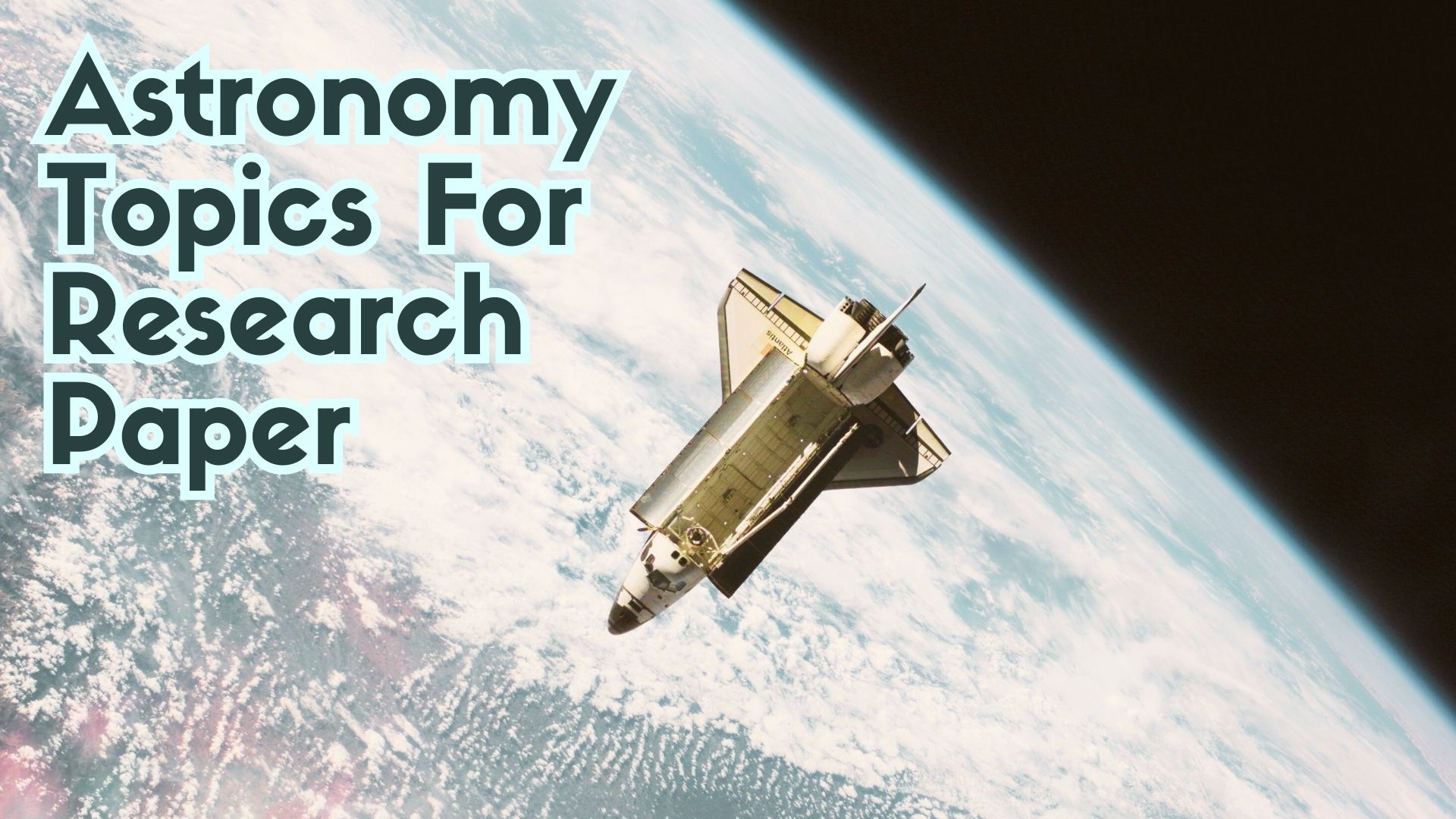
Astronomy Topics For Research Paper
This particular category suggests topics that are suitable for research papers in astronomy. Professionals, online writers, class teachers, college and university students, as well as professors will find the following topics excellent:
- The role of dark matter in galaxy formation
- Investigating the nature of dark energy
- Probing the mysteries of neutron
- Supernovae and their importance in the universe
- The discovery and characterization of exoplanets
- Stellar evolution and supernovae: Investigating the life cycles of stars, including their birth, evolution, and explosive deaths as supernovae
- The search for primordial black holes
- Stellar abundances: Tracing chemical evolution
- Interstellar medium: Composition, dynamics, and evolution
- Gravitational lensing: Probing the mass distribution of galaxy clusters
- Protoplanetary disks and planet formation
- Dwarf galaxies: formation and dark matter content
- Supernovae Remnants: probing stellar explosions
Space Science Topics
These topics encompass a broad range of scientific investigations related to space. Interesting topics include:
- Studying the dynamics of planetary atmospheres and weather patterns
- The exploration of moons in our solar system
- Exploring the nature of gravitational interactions in multiple star systems
- Investigating the nature of black hole mergers
- Investigating the origins of cosmic magnetic fields
- The role of space weather in satellite communications
- The study of planetary geology and surface features
- Studying the atmospheres of exoplanets using spectroscopy
- Probing the mysteries of white dwarfs and their evolutionary paths
- Exploring the possibilities of asteroid mining
- Understanding the formation of planetary rings
- The study of space debris and its impact on space exploration
- Investigating the physics of solar flares and coronal mass ejections
Astrophysics Research Topics
This particular topic focuses on research topics within astrophysics which entail the study of celestial objects and phenomena. The best topics to consider are:
- Understanding the physics of gamma-ray astronomy and its implications
- Probing the physics of stellar explosions: Supernovae and gamma-ray bursts
- Exploring the properties of interplanetary magnetic fields and solar wind
- The study of high-energy astrophysical phenomena: Ray binaries and pulsars
- Investigating the physics of stellar oscillations and asteroseismology
- Understanding the physics of accretion disks around black holes
- The study of interstellar turbulence and its impact on star formation
- Investigating the nature of dark energy through cosmic microwave background
- Understanding the dynamics of galactic collisions and mergers
- Exploring the mechanisms behind stellar magnetic fields and activity
- Probing the physics of gravitational waves and their sources
- The study of relativistic jets from active galactic nuclei
- Investigating the role of magnetic fields in star formation processes
Space Exploration Topics
These are topics that revolve around the exploration of space and entail:
- The future of human colonization of Mars and other celestial bodies
- Investigating the formation and evolution of planetary systems beyond our solar system
- Investigating the potential for life on moons of gas giants
- Exploring the potential for resource utilization on the moon and asteroids
- The study of space tourism and its challenges
- The study of space-based gravitational wave detectors
- Exploring the possibilities of interstellar travel and propulsion systems
- Understanding the challenges and prospects of manned deep space missions
- The role of robotic missions in planetary exploration
- Investigating the feasibility of asteroid deflection strategies
- Investigating the potential for terraforming other planets
- Exploring the mysteries of the outer heliosphere and heliopause
- The study of space-based telescopes and observatories
Research Topics In Cosmology
This particular category explores research topics within cosmology which is essentially the study of the origin of evolution and the structure of the universe. Some good topics to consider for scientific thesis writing include:
- Understanding the nature and properties of cosmic neutrinos
- The study of the cosmic microwave background radiation and its implications
- Exploring the physics of dark energy and its implications
- Understanding the large-scale structure of the universe
- Investigating the Role of baryonic acoustic oscillations in Cosmology
- Investigating the nature of primordial gravitational waves
- The study of the early universe and the era of recombination
- Exploring the possibilities of a multiverse
- Probing the nature of cosmic strings and other topological defects
- The study of cosmic voids and their impact on galaxy formation
- Investigating the physics of inflationary models
- Understanding the formation and evolution of cosmic filaments
- Probing the nature and properties of dark matter candidates
Astronomy Topics To Write About
If you are a student looking for the best astronomy topics to write about, here are excellent suggestions:
- The formation and evolution of galaxies
- The study of cosmic rays and high-energy particles
- The life cycle of stars: From birth to death
- Investigating the origins and evolution of the solar system
- The search for extraterrestrial intelligence (SETI)
- The Impact of Asteroids collisions on Earth’s History
- The Role of dark matter in the Universe
- Exploring the magnetic fields of celestial objects
- Exoplanet discoveries and characterization
- The structure and dynamics of spiral galaxies
- The nature of black holes: Mysteries and discoveries
- The detection and study of gravitational waves
- The Origins of the Universe: big bang cosmology
Cool Astronomy Topics
- Time dilation: The effects of relativity on observations
- Stellar Archeology: Unraveling the Secrets of old stars
- Stellar Nurseries: birthplaces of new stars
- The evolution of galaxies in galaxy clusters
- Exoplanet atmosphere: Clues for habitable worlds
- Strange Planets: Exotic discoveries beyond our solar system
- The Origins of Fast Radio Bursts (FRBs)
- The potential existence of a parallel universe
- The Kuiper Belt: Exploring the Icy Worlds Beyond Neptune
- Exploring supermassive black holes at the centers of galaxies
- Quasars: cosmic powerhouses and lighthouses
- The surprising behaviors of pulsars and magnetars
- The great attractor: Unveiling the Mysteries of cosmic flows
Interesting Space Topics
- Space debris: challenges and solutions for orbital cleanup
- Space mining: opportunities and ethical considerations
- Space-based telescopes: Expanding our view of the universe
- Space tourism: commercial ventures beyond Earth’s atmosphere
- Space weather: impacts on satellite communications and Earth’s environment
- The James Webb space telescope: A new era of observing the cosmos
- The search for water on Mars and its implication for life
- Mars colonization: challenges and benefits of establishing a human presence
- The lunar gateway: NASA’s Gateway to deep space exploration
- Astrobiology: Investigating the potential for life in extreme environments
- Space elevators: novel concepts for space transportation
- The Fermi Paradox: why haven’t we found extraterrestrial life yet?
- Planetary protection: safeguarding terrestrial bodies from contamination
Topics In Astronomy
- Stellar evolution: from protostars to supernovae
- The role of spiral density waves in shaping galaxies’ structures
- Galactic dynamics: The structure and evolution of galaxies
- The study of globular clusters: ancient stellar systems
- Observational techniques in astronomy: from telescopes to space missions
- White dwarfs and planetary nebulae: The final stages of stellar evolution
- Cosmic microwave background radiation: clues to the early universe
- Gamma-ray bursts: The most energetic explosions in the universe
- The Hertzsprung-Russell diagram: understanding stellar properties
- The Drake equation: estimating the number of technologically advanced civilizations
- The Doppler effect: Measuring the motion of celestial objects
- The role of interstellar dust in the absorption and scattering of light
- Variable stars: exploring the changing brightness of astronomical objects
- Astrochemistry: Understanding the chemistry of space
In conclusion, astronomy offers a vast realm of research possibilities ranging from the mysteries of dark matter and dark holes to the explorations of exoplanets. We understand that the field of astronomy can be a complex area to write a research paper on as a student. If you experience difficulties and look for someone to write a thesis for you , we do custom astronomy research papers, editing, and deliver them within no time. Whether you want a research paper or need thesis help, we have professional writers at your beck and call. We are cheap, fast, and trustworthy, and deliver high-quality and well-written research papers at a moment’s notice.
Make sure to check our posts with other topics before you leave:
- 163 Unique Artificial Intelligence Topics For Your Dissertation
- 121 Original Neuroscience Research Topics
- 211 Of The Most Interesting Earth Science Topics
- 214 Best Big Data Research Topics For Your Thesis
- 211 Interesting Engineering Research Paper Topics
- Experiment vs Observational Study: A Deeper Look
- 101 Best Computer Science Topics
What is the Big Bang Theory?
The big bang theory suggests that the universe originated from an extremely hot and dense state around 13.8 billion years ago. It goes further to explain the expansion and evolution of the cosmos including the formation of the stars, the galaxies, and the planets.
What is a black hole?
A black hole refers to a region in space with an intense gravitational pull that prevents anything, including light, from escaping. A black hole is formed when massive stars collapse under their own gravity forming a singularity surrounded by an event horizon.
What are exoplanets?
Exoplanets refer to planets that exist outside our solar system, orbiting stars other than the sun. The discovery of exoplanets has totally changed our understanding of the planetary system and the potential for habitable worlds beyond the Earth.
What is a dark matter?
Dark matter refers to a hypothetical form of matter that doesn’t interact with light or other electromagnetic radiation. It is generally inferred from its gravitational effects on visible matter and plays an instrumental role in explaining the dynamics of galaxies and the large-scale structure of the universe.

Leave a Reply Cancel reply
Your email address will not be published. Required fields are marked *
Comment * Error message
Name * Error message
Email * Error message
Save my name, email, and website in this browser for the next time I comment.
As Putin continues killing civilians, bombing kindergartens, and threatening WWIII, Ukraine fights for the world's peaceful future.
Ukraine Live Updates
Stargazing into the Future: Top Astronomy Research Topics
Table of contents
- 1 Astrophysical Magnetism and the Interstellar Medium: Astronomy Research Topics
- 2 Black Holes: Unveiling the Dark Mysteries of the Cosmos
- 3 Cosmic Microwave Background: Echoes of the Big Bang
- 4 Dark Energy and Matter
- 5 First Stars, Exoplanets, and Galaxies
- 6 Galaxy Clusters and Formation
- 7 Gravitational Lensing
- 8 Neutron Stars and Pulsars
- 9 Optical Surveys
- 10 Solar Physics
- 11 Exploring the Cosmic Frontier: Key Insights Unveiled
Welcome to the fascinating universe of astrophysics with our comprehensive article that illuminates the mysteries and marvels of space. Embark on an extraordinary voyage through the cosmos as we unravel the secrets of the universe in this captivating exploration of astrophysics.
Our article explores ten key astronomy research topics, each offering a gateway to understanding the complex phenomena that govern the stars, planets, and galaxies, inviting readers to dive deep into the wonders of space. Gain insights into the complex forces shaping the cosmos, from the smallest particles to the largest structures.
Continue reading to unlock the secrets of the universe and fuel your curiosity about the wonders beyond our planet.
Astrophysical Magnetism and the Interstellar Medium: Astronomy Research Topics
Astrophysical magnetism and the interstellar medium represents a cutting-edge field of astronomy focused on understanding the magnetic forces at play within the cosmos and the matter that fills the space between the stars. This field examines magnetic influences on star and galaxy formation, cosmic ray behavior, and interstellar cloud dynamics, integrating observation, theory, and modeling to understand the universe’s magnetic aspects.
- Investigating magnetic fields’ role in the interstellar medium and star birth.
- Charting Cosmic Magnetism: Space Topics for Project.
- Space Research Topics about Astrophysical Plasma Processes.
- Astronomy Essay Topics about Magnetic Fields in Galaxy Evolution: Astronomy Essay Topics.
- Interesting Topics in Astronomy about Magnetars.
- Astronomy Topics to Write About Magnetic Reconnection Events.
- Cosmic Rays’ Journey Through Magnetic Fields.
- Astronomy Research Questions in Detecting Cosmic Magnetism.
- Crucial role of Molecular Clouds and Magnetism in star-forming regions and the lifecycle of stars.
- The impact of magnetism on the gas and dust between stars.
Black Holes: Unveiling the Dark Mysteries of the Cosmos
Black holes represent one of the most fascinating subjects in the field of astrophysics, captivating scientists and the public alike with their enigmatic nature and the extreme physics surrounding them. This area of study delves into the formation, evolution, and effects of these cosmic phenomena, exploring how they warp spacetime, influence their surroundings, and provide key insights into the workings of the universe.
- The Event Horizon Telescope’s View of Sagittarius A.
- Hawking Radiation: Unraveling Black Hole Mysteries.
- Black Hole Binaries and Gravitational Wave Emissions.
- Accretion Disks and High-Energy Astrophysics.
- Primordial Black Holes and the Early Universe.
- The Information Paradox: Debating Black Hole Mysteries.
- Interstellar Black Holes: Navigating the Invisible.
- Supermassive Black Holes and Galaxy Formation.
- Visualizing Black Holes: Simulation and Interpretation.
- Quasars and Active Galactic Nuclei: Black Holes in Action.
Cosmic Microwave Background: Echoes of the Big Bang
The Cosmic Microwave Background (CMB) is a relic radiation that offers a snapshot of the universe just 380,000 years after the Big Bang, serving as a cornerstone for cosmology. Researchers study the CMB to understand the early universe’s conditions, the formation of cosmic structures, and the fundamental parameters that define our cosmos.
- Mapping the Universe’s Baby Picture.
- The Polarization of the CMB.
- Anomalies in the Cosmic Microwave Background.
- CMB and the Hubble Tension.
- Cosmic Neutrinos and the CMB.
- Dark Matter Imprints on the CMB.
- The Search for B-Mode Polarization.
- Planck Satellite Discoveries.
- The CMB’s Role in Large-Scale Structure Formation.
- Future Missions to Study the CMB.
Dark Energy and Matter
Exploring the enigmatic components of the cosmos that do not emit, absorb, or reflect light, dark energy and dark matter remain some of the most profound mysteries in astrophysics. Dark energy, a force that accelerates the expansion of the universe, and dark matter, an unseen substance that holds galaxies together, together comprise most of the universe’s mass-energy content. Research in this area aims to unravel their nature through theoretical models and observational evidence.
- Mapping the Invisible: Tracking Dark Matter in the Cosmos.
- The Accelerating Universe: Unveiling the Nature of Dark Energy.
- Cosmic Clues: The Role of Dark Matter in Galaxy Formation.
- Einstein’s Cosmological Constant and the Mystery of Dark Energy: Research Topics About Space.
- Gravitational Lensing: Astronomy Topics to Research a Window into Dark Matter.
- The Dark Sector: Interactions Between Dark Matter and Dark Energy: Topics About Astronomy.
- Astronomy Topics for Research Paper about Neutrinos and the Dark Universe: Tracing Invisible Particles.
- The Cosmic Microwave Background: Insights into Dark Matter and Energy: Interesting Astronomy Topics.
- Astronomy Research Paper Topics about Galactic Rotation Curves: The Dark Matter Evidence.
- Space Exploration Topics about Future Observatories and the Quest for Dark Matter.
First Stars, Exoplanets, and Galaxies
This field examines the origins and early evolution of the universe’s first stars, the formation and characteristics of exoplanets, and the development of galaxies. These topics cover a broad spectrum from the cosmic dawn, when the first stars ignited, through the assembly of galaxies, to the current era where telescopes search for planets around distant stars, offering insights into the processes that shaped the cosmos.
- Dawn of the Cosmos: The Life and Death of the First Stars.
- Hunting for Other Worlds: Discovering New Exoplanets.
- The Assembly of Galaxies: Insights from Deep Space Observations.
- Chemical Signatures: Tracing Galaxy Evolution Through Spectroscopy.
- Astrophysics Research topics about the Role of Dark Matter in Shaping Early Galaxies.
- Star Formation Rates and the Growth of Galaxies.
- Detecting the Atmospheres of Distant Exoplanets.
- Population III Stars: Unlocking the Secrets of the Universe’s First Lights.
- The Search for Life: Targeting Earth-like Exoplanets.
- Galactic Nuclei and the Seeds of Supermassive Black Holes.
Galaxy Clusters and Formation
Galaxy clusters, the largest gravitationally bound structures in the universe, serve as excellent laboratories for studying the formation of cosmic structures, the behavior of dark matter, and the thermodynamics of the intergalactic medium. This area of research not only sheds light on the cluster formation and evolution but also on the larger-scale structure of the universe and the fundamental laws that govern it.
- Space Topics to Research The Gravitational Architecture: Mapping Galaxy Clusters.
- Dark Matter Skeletons: The Structure of Cosmic Webs.
- Hot Gas and Galactic Giants: The Intracluster Medium.
- Colliding Titans: Studying Galaxy Cluster Mergers.
- The Sunyaev-Zel’dovich Effect: CMB Shadows.
- Lensing Mass: Weighing Galaxy Clusters.
- Star Formation in Extreme Environments.
- The Butcher-Oemler Effect: Evolution of Galaxies in Clusters.
- Feedback Processes in Galaxy Cluster Cores.
- Cosmology with Galaxy Clusters: Understanding the Universe’s Expansion.
Need help with research paper writing? Get your paper written by a professional writer Get Help Reviews.io 4.9/5
Gravitational Lensing
Gravitational lensing, the bending of light by massive objects, acts as a natural telescope, magnifying distant galaxies, revealing objects otherwise too faint to see, and providing a unique tool for testing theories of gravity and the nature of dark matter. Studies in gravitational lensing span from observing the most distant galaxies to understanding the distribution of dark matter in the universe.
- Einstein’s Lens: Confirming General Relativity.
- Cosmic Magnification: Discovering the Distant Universe.
- Hunting Dark Matter Through Lensing Anomalies.
- Microlensing: Revealing Rogue Planets and Dark Objects.
- Strong Lensing: Arcs and Rings in the Sky.
- Weak Lensing: Mapping the Dark Universe.
- Lensing and Cosmic Shear: Observing the Shape of the Universe.
- Time-Delay Cosmography: Measuring the Universe’s Expansion.
- Galaxy Evolution Through the Lens.
- The Future of Lensing: New Frontiers with Next-Generation Telescopes.
Neutron Stars and Pulsars
Neutron stars and pulsars present extreme states of matter, with densities exceeding that of atomic nuclei. These objects provide insight into the physics of the cosmos, from the nuclear reactions in their interiors to the powerful magnetic fields that drive pulsar emissions. Research in this area explores the aftermath of supernovae, the nature of dense matter, and the fundamental principles of physics under extreme conditions.
- Birth from Catastrophe: The Creation of Neutron Stars.
- Pulsars: Lighthouses of the Cosmos.
- The Extreme Physics of Magnetars.
- Binary Pulsars and Tests of General Relativity.
- The Internal Composition of Neutron Stars.
- Gravitational Waves from Neutron Star Mergers.
- Pulsar Timing Arrays: Probing the Cosmic Web.
- Fast Radio Bursts and Neutron Star Mysteries.
- Neutron Star Cooling and Nuclear Physics.
- The Search for Isolated Neutron Stars.
Optical Surveys
Optical surveys have revolutionized our understanding of the universe, from mapping the distribution of galaxies and dark matter to discovering transient cosmic events. These large-scale observations provide a comprehensive view of the sky, enabling the discovery of new celestial phenomena and offering insights into the structure and evolution of the cosmos.
- The Legacy of the Sloan Digital Sky Survey.
- Transients in the Night: Catching Supernovae and Gamma-Ray Bursts.
- Mapping the Milky Way: Gaia’s Billion-Star Survey.
- The Dark Energy Survey: Unraveling Cosmic Acceleration.
- Pan-STARRS: A Panoramic View of the Sky.
- The Vera C. Rubin Observatory and the LSST Project.
- Hunting for Minor Planets: Optical Surveys in the Solar System.
- The Zooniverse: Citizen Science and the Cosmos.
- The Future of Sky Surveys: AI and the Next Decade.
- Ultra-Deep Fields: Peering into the Cosmic Dawn.
Solar Physics
Solar physics focuses on understanding the Sun, from its core to the outer layers of the solar atmosphere, and its influence on the solar system. This research is crucial for predicting solar activity, understanding the mechanisms behind solar flares and coronal mass ejections, and their impact on space weather, which can affect Earth’s technological systems.
- The Solar Dynamo: Driving the Sun’s Magnetic Cycle.
- Coronal Mass Ejections: Impact on Earth’s Space Environment.
- Solar Flares: Unraveling the Mechanisms of Solar Storms.
- Helioseismology: Probing the Sun’s Interior.
- The Solar Wind: Understanding Its Origins and Variability.
- Sunspots and Solar Activity: Patterns and Predictions.
- The Parker Solar Probe: Touching the Sun.
- Solar-Terrestrial Relations: The Impact of the Sun on Earth.
- The Chromosphere and Corona: Observing the Sun’s Outer Layers.
- Advances in Solar Observation Technologies.
Exploring the Cosmic Frontier: Key Insights Unveiled
This article takes us on a profound journey through the universe’s mysteries, from the warping effects of gravitational lensing to the extreme environments of neutron stars and pulsars. Key takeaways include the significant role of gravitational phenomena in understanding cosmic structure, the critical insights provided by the study of the universe’s densest objects, and how these studies illuminate the dark corners of our universe. By delving into these topics, we gain a deeper appreciation for the intricate tapestry of the cosmos and the fundamental principles that govern its vast expanse.
Readers also enjoyed

WHY WAIT? PLACE AN ORDER RIGHT NOW!
Just fill out the form, press the button, and have no worries!
We use cookies to give you the best experience possible. By continuing we’ll assume you board with our cookie policy.
Thesis Helpers
Find the best tips and advice to improve your writing. Or, have a top expert write your paper.
Top 50 Astronomy Topics for Students

Let’s face it: astronomy topics are not easy to come by these days. And even when you find some, there is a very big chance they have been already taken by some of your classmates. Even finding some different simple topics to talk about in astronomy can prove to be a challenge. You definitely don’t want to write an essay on a topic that has been beaten to death already.
You want your topic to be of interest. You want it to be relevant and stand out from all the others. This is precisely why you need our list of excellent astronomy topics. We have 50 right here, and you can use them for free. Periodically, our thesis writers are updating the list to introduce new topics as frequently as possible.
Why Pick Only the Best Astronomy Research Topics?
OK, but why would you need to find the best astronomy research topics? The truth is that finding some excellent astronomy paper topics is one of the easiest ways to get a top grade. Here are some of the benefits of picking an idea from our astronomy topics list:
Your astronomy paper will be unique because nobody will probably think about the topic you choose. This means that your paper will stand out from the rest instantly. Professors love interesting astronomy ideas. In other words, they will read your paper from start to finish. Pique the interest of your professor and you will surely keep him reading. You can get bonus points on your astronomy research paper if the topic is original and highly interesting. Professors award students who demonstrate originality. Picking one of our astronomy topics to write about saves you a lot of time and effort. Why spend hours doing research when you can pick a topic and start writing right now?
One more thing you need to keep in mind though is that even the best of astronomy research topics can’t save you from a low grade if you don’t write the paper the right way. The topic can earn you some bonus points, but your professor will look for many other things in your essay. Make sure you know how to write a proper essay or, if you don’t, get some quick help from our degree-holding ENL writers.
Where to Search for Topics in Astronomy
There are several places where you can find astronomy essay topics, of course. One can try the library and read astronomy journals and papers until he or she finds a good idea. Another interesting choice would be to ask around on forums and social media. Maybe somebody will help you. Of course, you can also search for astronomy project topics online, but your classmates have probably beaten you to the best ones out there.
Our list of topics of astronomy is updated periodically, so there is a very big chance your peers have missed at least some of the topics. Our academic writers have extensive experience writing astronomy essays, so our supply of topics is virtually endless.
Most Interesting Astronomy Topics
If you want to write an excellent essay, you need only the most interesting astronomy topics. Check out these great topics:
- Methods used to detect exoplanets today.
- What lies beyond our Milky Way?
- What happens during a Sun eclipse?
- The full history of manned space flight.
Astronomy Topics for Research Projects
Are you looking for astronomy topics for research projects? We have the best solution for you. Pick one of our topics below:
- Determining the angular diameter of the Moon (experiment).
- How does the Sun affect our water bodies?
- Latest space tech and breakthroughs.
- Why are Musk’s Startlink satellites important?
Fresh Astronomy Paper Topics
Even though all our astronomy topics are updated for 2020, here are some new, fresh astronomy paper topics for you:
- Listening to the echoes of a solar storm.
- Legends that involve the start in the sky.
- How did our planet came to be?
- What causes a star to go supernova?
- Latest developments in NASA’s Shuttle Program.
Cool Astronomy Topics
Do you want your astronomy essay to stand out from the rest? Pick one of our cool astronomy topics:
- Here is how the universe is constantly expanding.
- Can we discover a way to travel in time?
- How do the Mars rovers work?
- Problems with satellite communications.
Astrophysics Essay Topics
Astrophysics is a very difficult field, we know. You need the best topics possible for a top grade. Here are some astrophysics essay topics for you:
- What is dark matter and where can it be found?
- Why are moons orbiting planets?
- The light spectrum of stars in distant galaxies.
- Can physics find what we call the multiverse?
Complex Astronomy Project Ideas
If you want to write a complex paper that will earn you a very good grade, you need to see our amazing list of astronomy topics for projects:
- The ins and outs of robotic space exploration.
- The future of space exploration.
- Making business in space.
- Define and explain star clusters.
- What does the Mars colonization mean for the human race?
Easy Astronomy Science Project Ideas
Maybe you don’t want to spend a few days writing the astronomy essay. Here are some easy astronomy science project ideas that will help you write it faster:
- How is a star born?
- Proof that supports the Big Bang theory.
- Searching for life on other planets.
- The effects of the Sun on our planet.
- Satellites and 5G wireless data transfer.
Best Astronomy Topics for Presentation
Our writers have selected the absolute best astronomy topics for presentation. Pick any of them and use it for free:
- This is how the Universe was born.
- Top 3 reasons we need to explore our solar system.
- Why is Pluto not a planet?
- Kepler’s contribution to astronomy.
Astronomy Topics for College Students
Our astronomy topics for college students are a bit more difficult, but are still relatively easy to research and write. Pick one now:
- The process of planet melting.
- Calculating the mass and density of our solar system.
- Why time-travel is impossible to discover.
- How did ancient humans see the most important constellations?
- What is an exoplanet?
Excellent Astronomy Research Paper Topics
If you need to write a research paper on astronomy, you definitely need to take a look at our list of excellent astronomy research paper topics:
- The slow process of black hole birth.
- What does it take for humans to survive on Mars?
- Did we really land on the Moon?
- The life of an unremarkable star.
- Is light-speed travel possible in the near future?
Astronomy Topics for High Schools Students
If you are in high school, we have some easier topics for you. Pick one of our astronomy topics for high schools students and start writing:
- What causes light pollution?
- Why are some of the galaxies “active”?
- Copernicus’s heliocentric model.
- What is dark energy?
If you didn’t find the topics in astronomy you were looking for on this page, explore more academic topics . You can also return to the blog post later because we update the topics frequently. However, your best option would be to get in touch with us directly. Our academic writers can make a list of 100% original topics for you in no time. And the best part is that these people know exactly what your professor wants. Order a fresh list of interesting astronomy topics and get a top grade on your next essay!
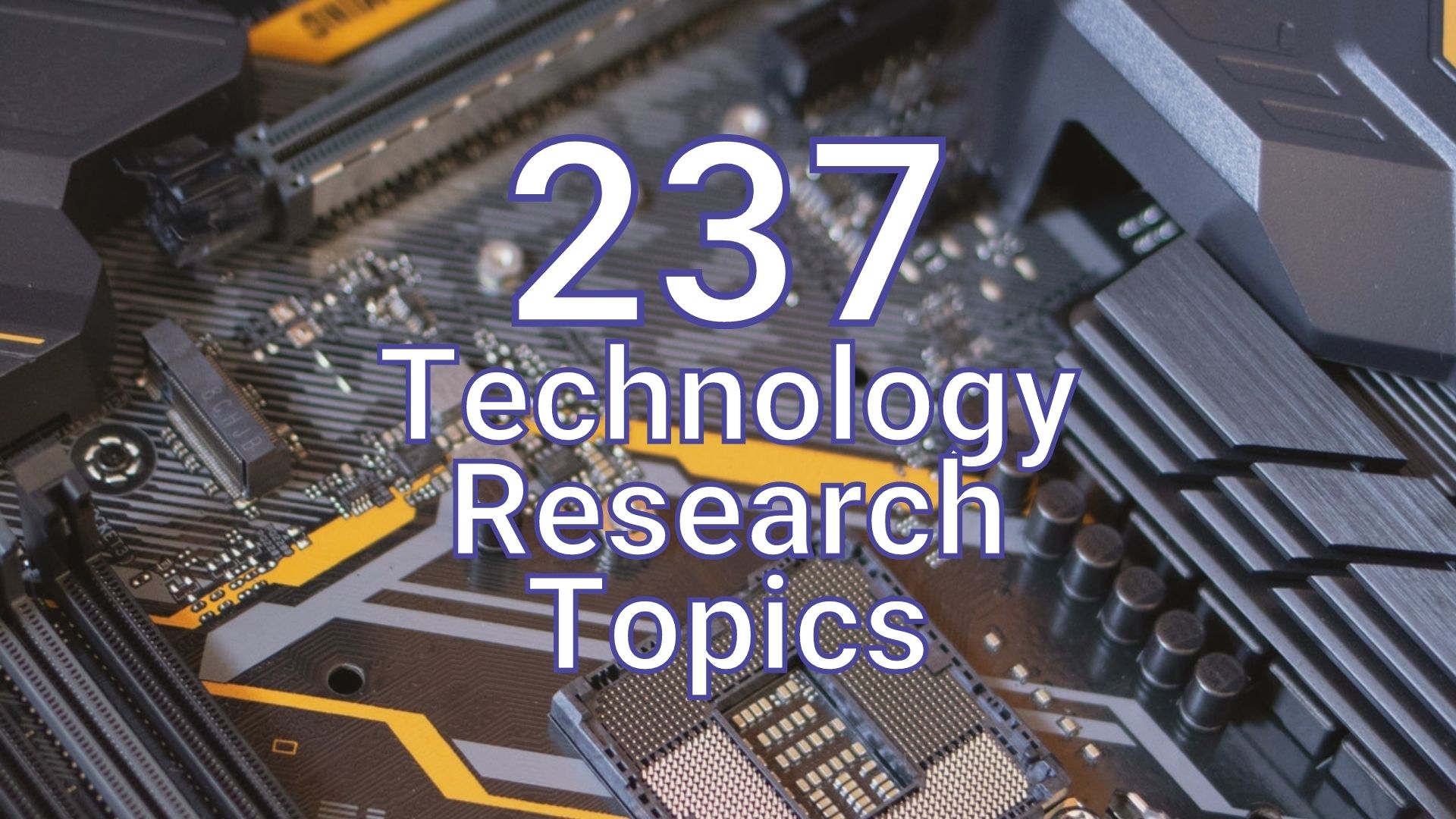
Make PhD experience your own
Leave a Reply Cancel reply
Your email address will not be published. Required fields are marked *
109 Space Exploration Essay Topic Ideas & Examples
🏆 best space exploration topic ideas & essay examples, 📑 good research topics about space exploration, ⭐ simple & easy space exploration essay titles, 💡 interesting topics to write about space exploration, ❓ research questions about space exploration.
- The Future of Space Exploration The attitude of the researchers in this field is rather ambivalent; the main beneficial and negative points of space exploration would be covered in the next parts to make the argumentative and clear statement.
- The Importance of Space Exploration It is evident in the study that spaceflight was the most instrumental element that acted as the driving force and backbone of the exploration processes to the orbital surface.
- India’s Mission to Mars The writer of this paper argues that India’s mission to Mars indicates a lack of prioritization by the national government and therefore, a waste of resources.
- Planet Jupiter Facts and Information In terms of size, it is the largest of all the planets and it is number five from the sun.”The diameter of Jupiter is 142984 kilometers and its density is 1.
- The Main Reasons for Space Exploration In 1957, the Soviet successfully launched the first satellite into space that marked the beginning of space exploration. After the success of the Soviet’s satellite, the U.S.invested more into space exploration.
- The Planet Mars Information The bigger portion of the planet is covered with Borealis Basin that is one of the remarkable features on the surface of Mars.
- Space Exploration Problems On the other hand, people have an opportunity to study the processes which could be useful for understanding the origins of planets, galaxies and the universe in general. BNSC reflected on the plans that UK […]
- Space Exploration History and Prospects The exploration of space assists in addressing the central questions about humanity’s place in the history of the universe and the solar system. Scientists are working day and night to reveal ways of mitigating the […]
- India’s Space Exploration Affairs Space exploration has become a key area of concern for modern scientists and this is evident from the many attempts being undertaken in the world today to explore every bit of the outer space.
- A Mars Rover’s Risk Management The risk of a high obstacle, dictated by the motor’s power, can put the rover into an endless loop of attempts to climb to the surface, as a result of which fuel resources may run […]
- Mars: The Exploration of the Red Planet Mars, the fourth planet in order of increasing distance from the sun and the first beyond the earth’s orbit. Following several crewless flybys and orbiters launched by the United States and by the Soviet Union, […]
- Space Exploration: Attitude & Recent Breakthrough It created the basis for the development of natural science and technologies. Moreover, from the social perspective, overcoming the challenges of surviving in space requires cooperation and the development of communities.
- Landed Missions to Mars: The Perseverance Rover According to Farley et al, the mission of the Perseverance rover lies “in the deep search for evidence of life in a habitable extraterrestrial environment, and the return of Martian samples to Earth for analysis […]
- Use of Nanotechnology for Electric-Power Production on Mars This paper explores the possible options of electric-power production sources and attempts to gain insight into the benefits of the application of the most recent scientific developments, such as nanotechnology, for enhancing and expanding the […]
- Space Exploration Mission: Mars Reconnaissance Orbiter The historical development of Mars Reconnaissance Orbiter is anchored on the dual mission which was targeted for in the 2003 Mars launch window; nonetheless, within the course of the drafting the proposal the MRO was […]
- Space Exploration: The Venus Observation Mission However, the implementation of the new machinery will be further needed to collect and transfer data from Venus to the Earth.
- Venus: The Object for Research and Space Missions The current offer is unique in that it is planned to launch modules on the surface of Venus and keep them active for a long time.
- Liquid Lake on Mars As a matter of fact, it is also an interesting article because it revolves around the probability of having a new form of life in the Solar System outside the Earth.
- Mars Reconnaissance Orbital Some challenges were encountered with two of the devices mounted on the Mars Reconnaissance Orbiter in November. The HiRISE installed in the Mars Reconnaissance Orbiter has shown over time that, it is of great importance […]
- Humanities: Galileo and Four Moons of Jupiter Galileo would have value to the Medicis only insofar as he was seen to be a great discoverer of new things and a brilliant philosopher, the doyen of his profession.
- Technology Uncertainty in Space Exploration Hence, learning the complexity of the project to be undertaken takes the largest part of the entire process. In an environment where projects have to be undertaken, organizations cannot elude the dire need of integrating […]
- The Contributions of Dwight Eisenhower to America’s Success in Their Space Exploration Efforts When he took over the presidency he saw the importance of incorporating space technology in the country’s defense mechanism and in this respect he directed that the construction of ballistic missiles and also the construction […]
- “Mars the Abode of Life” by Percival Lowell The main arguments of the book revolve around the genesis of the world, the evolution of life, the dominance of the sun, Mars and the future of the earth, the canals and oases of Mars […]
- General Features of Jupiter 86 years to complete one orbit The distance of Jupiter from the earth taken on 4th June 2013 at 0655 hours GMT is 4.6 AU. The distance of Jupiter from the sun as of now […]
- Mars Curiosity Mission’s Astronomical Research In addition, the age of the samples coincides with the date where the water was present on the planet, according to the current understanding.
- Gifts of Mars: Warfare and Europe’s Early Rise to Riches The article “Gifts of Mars: Warfare and Europe’s early rise to riches” by Nico Voigtlander and Hans-Joachim Voth illustrate how the political situation in Europe had shaped the economic development of the continent in the […]
- Jupiter: From a Wandering Star to the King of the Planets In spite of the fact that Jupiter is more distant than Mars to the Earth, it is usually brighter, and it shines during the whole year around.
- Inner Space Exploration Vehicles There are three common types of underwater vehicles such as autonomous underwater vehicle, human occupied vehicles, and remotely operated vehicles. In addition, there are some human occupied vehicles that are simply used to visit life […]
- Space Exploration Aviation Safety: Challenger and Columbia Among the variety of accidents that take human lives in the sphere of aviation, the cases of Challenger and Columbia remain to be one of the most significant and influential.
- Space Exploration Accidents: Challenger and Columbia The failure in the joint of the elements of the rocket motor caused the Challenger catastrophe. The analysis of the accidents led to the development of a number of recommendations.
- A Trip to Mars: Approximate Time, Attaining Synchrony & Parking Orbit 9 years and in essence one can draw this logical induction that the elliptical orbit through which an astronomer moves from the Earth to Mars is relatively shorter than the elliptical orbit of Mars and […]
- Mars: Water and the Martian Landscape According to McSween, scientists and astronomers find the study of the environment of Mars and the existence of flowing of water on the surface of the planet of special interest.
- Astronomy Issues: Life on Mars Indeed, the absence of living microorganisms in the soil is a clear indication of the absence of water on the red planet.
- Market Based Approaches for Controlling Space Mission Costs This has however been addressed and there has been a recommendation that in any future missions using the same system, a mechanism has to be put in place that combines the development and operational phases […]
- Prospects of finding life in Mars Astronomers have found that the length of a typical day in Mars is similar to that of the Earth. This means that there is no water existed on the surface of Mars.
- Mercury Exploration and Space Missions The density of this planet is almost the same to that of the earth and this explains why the winds carried the eroded soils.
- Is there evidence of life on martian meteorites? Until then, researchers need to do the hard work of verifying or refuting existing theories and counterchecking any new evidence that could be contained in the Martian meteorites According to Buseck et al, Nanocrystals of […]
- International Space Exploration: Improving Human Life Advances in space exploration, particularly the creation of the International Space Station, has enhanced the observation of the globe to provide better comprehension and solutions to environmental matters on earth.
- Mars Reconnaissance Orbiter The objectives include the search for past and/or present life on the planet, assess the presence and nature of the resources available in the planet for human exploration as well as understanding the climate and […]
- Why the Water Bears are the Most Appropriate Animals to Send to Mars for Human Research The water bears are the first animals known to be able to endure the insensitive atmospheric combination of low pressure and extreme radiation found in space.
- MAVEN Mission on Mars Factors related to the degree of radiation, the temperature of the planet, the level of ion dispersion within the atmosphere and the ability of solar wind to affect the Martian surface are all factors that […]
- Missions to Mars: Past, Present, and Future In this dual mission to Mars, Mariner 6 and 7 enabled the scientists to analyze the surface of Mars and the Martian atmosphere through the remote sensors in the spacecrafts besides the Mariners taking and […]
- Development of New Space Vehicles: Manned Flight to the Moon and Mars The Apollo 11 landing on the surface of the Moon represents the highest point yet in the conquest of the cosmos by man.
- Should America Spend More Money on Space Exploration?
- India’s Steps into Space Exploration
- Public Money Should Cut Down Expenses for Space Exploration
- Visionary Vintage Children’s Book Celebrates Gender Equality, Ethnic Diversity, and Space Exploration
- Immune System Dysregulation During Spaceflight: Potential Countermeasures for Deep Space Exploration Missions
- The Significance and Value of Exposing Students to Space Exploration
- Apollo 13: Space Exploration and the Traits and Cooperativeness of Explorers
- Isaac Asimov’s Wise and Witty Response to Those Who Question the Value of Investing in Space Exploration
- Why Ocean Exploration Should Be Funded at the Same Rate as Space Exploration?
- Practical Spin-Offs Resulting From Astronomy and Space Exploration
- The Explorer Traits and Cooperativeness in Space Exploration in Apollo 13 by Ron Howard
- Nuclear Power Sources for Space Exploration
- Space Exploration and Technology and the Pros and Cons Arguments
- Modern Societies Doom Without Space Exploration
- The Space Exploration Program: We Are on a Path of Decay
- Funding for Space Exploration Philosophy
- The Current State Regarding the U.S Space Exploration
- Sustainability and Discredit Arguments for Space Exploration
- Technological Advances Associated With Space Exploration
- Future of Human Space Exploration and Operations
- The Advantages and Disadvantages of Space Exploration
- The Three Astronauts: Umberto Eco’s Book About the Role of Space Exploration in World Peace
- Space Exploration and Tourism During the Cold War of 1947
- Let’s Spend Our Resources on Solving Social Problems Not Space Exploration
- The Link Between Space Exploration and Advancements in Science and Military Defense
- Innovations Needed for Deep Space Exploration
- Radiation Measurements Performed With Active Detectors Relevant to Human Space Exploration
- Space Exploration Beyond Low Earth Orbit
- Space Exploration and Its Impact on Earth
- Column Generation Based Heuristics for a Generalized Location Routing Problem With Profits Arising in Space Exploration
- Ethical Principles and Practices in Space Exploration
- Why Space Exploration and Innovation Is Important for the Human Race?
- Specific Immunologic Countermeasure Protocol for Deep-Space Exploration Missions
- The Early History, Present, and Future of American Space Exploration
- The Economic, Health, and International Agreement Issues of Space Exploration
- Dynamic Modeling, Simulation, and Velocity Control of Rocker-Bogie Rover for Space Exploration
- Humanity’s Quest for Space Exploration Throughout History
- The Early Life, Space Exploration and Political Service of Lyndon B. Johnson
- Can the High Costs of Space Exploration Be Justified?
- The Untold Story of the Black Women Mathematicians Who Powered Early Space Exploration
- What Is the Purpose of Space Exploration?
- What Is the Most Famous Space Exploration?
- How Did Space Exploration Begin?
- What Are the Risks of Space Exploration?
- How Does Space Exploration Benefit Us?
- Which Country Has the Most Space Exploration?
- Which Country Got to Space Exploration First?
- Is Space Exploration Very Important?
- What Are the Advantages and Disadvantages of Space Exploration?
- How Space Exploration Affected People’s Lives?
- How Has Space Exploration Improved Life on Earth?
- How Can We Improve Space Exploration?
- What Does the Future of Space Exploration Look Like?
- What Is the Best Space Exploration Technology?
- What Have We Gained From Space Exploration?
- Why Is Space Exploration So Slow?
- What Makes Space Exploration Travel Difficult?
- Why Is Space Exploration Expensive?
- What Is the Biggest Problem With Space Exploration?
- Who Controls Space Exploration?
- What Is the Most Interesting Fact About Space Exploration?
- Why Did Space Exploration Stop?
- What Challenges Do Space Explorers Face?
- How Many Space Explorations Have Failed?
- How Does Space Exploration Affect the Economy?
- Chicago (A-D)
- Chicago (N-B)
IvyPanda. (2023, October 26). 109 Space Exploration Essay Topic Ideas & Examples. https://ivypanda.com/essays/topic/space-exploration-essay-topics/
"109 Space Exploration Essay Topic Ideas & Examples." IvyPanda , 26 Oct. 2023, ivypanda.com/essays/topic/space-exploration-essay-topics/.
IvyPanda . (2023) '109 Space Exploration Essay Topic Ideas & Examples'. 26 October.
IvyPanda . 2023. "109 Space Exploration Essay Topic Ideas & Examples." October 26, 2023. https://ivypanda.com/essays/topic/space-exploration-essay-topics/.
1. IvyPanda . "109 Space Exploration Essay Topic Ideas & Examples." October 26, 2023. https://ivypanda.com/essays/topic/space-exploration-essay-topics/.
Bibliography
IvyPanda . "109 Space Exploration Essay Topic Ideas & Examples." October 26, 2023. https://ivypanda.com/essays/topic/space-exploration-essay-topics/.
- Gravity Research Topics
- Aviation Paper Topics
- Solar Energy Essay Ideas
- Vehicles Essay Topics
- Pseudoscience Topics
- Nuclear Power Questions
- Innovation Titles
- Aliens Research Topics
123 Topics about Space
For a space essay, you need a rocketing title! Welcome to our space essay topics, where we journey beyond Earth’s boundaries. Space exploration, astronomy, and the mysteries of the universe have captivated human curiosity for centuries! Go through these space topics for presentation and uncover the wonders arising from our quest to understand the cosmos.
🚀 TOP 7 Topics about Space
🏆 best space essay topics, 👨🚀 space exploration topics, ✍️ space essay topics for college, 🌶️ hot research questions about space, ❓ space topics for presentation.
- Arguments for Space Exploration
- Indian Space Mission and Its Negative Aspects
- Mathematics and Space Travel
- Investing in Climate Change vs. Space Exploration
- Valero Refinery Disaster and Confined Space Entry
- Space Exploration: The Liberal Arts Lenses
- The Space Shuttle Challenger Engineering Ethics
- Ocean Research vs. Outer Space Exploration Both the study of the outer space and the research of the processes that take place on Earth, particularly, in the ocean, are crucial for facilitating the safety of the humankind.
- The Transcendental Exposition of the Concept of Space The Transcendental Exposition of the Concept of Space postulates that humans have a pure instinct of space, a concept that is commonly referred to as the argument from geometry.
- Space Exploration: India Space Mission The following paper will discuss the topic of ISRO to launch India’s first spacecraft to Mars. Some of the benefits attributed to the mission relate to the race between India and China.
- Space Investigation and Its Limits Humanity has always been trying to investigate nature and discover new things. The thrill of knowledge resulted in numerous discoveries that altered the way we evolved.
- NASA’s Efforts of Space Colonization: Pros and Cons NASA’s active efforts in space colonization are based on evidence and economically viable, but the concerns on the long-term sustainability aspects are valid.
- The International Space Station: Building for the Future The International space station is a globally established exploration facility constructed in a low- world orbit. It is the biggest space station ever assembled.
- Space Shuttle Challenger Disaster: Causes of the Tragedy and the Measures to Be Taken On January 28, 1986, the Challenger was launched to explode 73 seconds after its lift-off. The tragedy is commonly called “the worst disaster in the history of the space program”.
- The Future of the Space Missions The current obsession with space discoveries leaves enough room for innovative developments in the area that are expected to take humanity closer to interplanetary missions.
- The Space Shuttle Challenger Disaster The space shuttle is known to be one of the most ambitious projects of the modern age. The idea to create a spaceship seemed fantastic and even ridiculous.
- The NASA Space Colonization Plans The National Aeronautics and Space Administration is putting efforts into advancing space colonization by using its existing competencies.
- High-Temperature Materials Selection: Space Shuttle Shield and Turbochargers The paper analysis the service requirements for these components and attempts to find the group of material that would suit these products.
- Space Telescope Science Institute Presentation This paper presents a reflection on the presentation hosted by the Space Telescope Science Institute. The event provided insight about scientific idea and Hubble press releases.
- Astronomy: International Space Station The space station operating at international level known as ISS is a partnership operation comprised of several countries with a common objective of conducting space explorations.
- The Evolution of Space Exploration: From the Space Race to the Present.
- The Mars Rover Missions: Unveiling the Mysteries of the Red Planet.
- Collaborative Research and Human Survival at the International Space Station.
- Pioneering Female Astronauts and Their Contributions.
- Prospects and Challenges of Lunar Colonization.
- The New Space Age: Private Companies and the Future of Space Travel.
- Space Tourism: Commercial Ventures Beyond Earth’s Atmosphere.
- The Role of Satellites in Modern Life.
- Asteroid Mining: Tapping into Celestial Resources for Earth’s Benefit.
- The Search for Earth-Like Worlds – Exoplanets and Habitable Zones.
- Expanding Our Understanding of the Universe with the Space Telescopes.
- Space Junk and Debris as the Growing Threat to Spacecraft.
- Challenges and Possibilities of Journeying Beyond Our Solar System.
- The James Webb Space Telescope: Opening New Windows to the Universe.
- What Are the Potential Barriers to Advanced Spacefaring Civilizations?
- Voyages to Explore Beyond Our Planetary Neighborhood.
- The Cosmic Microwave Background: Insights into the Early Universe.
- Space Weather and Its Impact on Earth’s Technological Infrastructure.
- Can We Estimate the Number of Communicative Extraterrestrial Civilizations?
- Space Law and Governance: Regulations for Activities Beyond Earth.
- The Challenges of Propulsion Systems for Interplanetary and Interstellar Travel.
- Robotic Vs. Human Space Exploration: Pros and Cons of Each Approach.
- The Search for Extraterrestrial Intelligence and Contact.
- The Discrepancy Between the High Probability of Extraterrestrial Life and the Lack of Contact.
- The Implications of Discovering Microbial Life Beyond Earth.
- The Concept of Space Elevators: An Alternative to Rocket-Based Space Access.
- Ethical Considerations and Potential Impacts on Indigenous Martian Environments.
- The Search for Cosmic Signatures of Life: Biosignatures and Technosignatures.
- The Effects of Microgravity on Human Health.
- The Long-Term Viability of Human Settlements on Other Planets.
- Space Studies: Why Should People Enter Space? Space exploration has benefited the earth and those who live on it. Humans have already made improvements to technology and medicine due to space exploration.
- Katya Echazarreta, a Mexican American Woman in Space This paper considered the first case when Katya Echazarreta, a Mexican-born American woman, was sent into orbit for the first time in the history of space exploration.
- The National Aeronautics and Space Administration: Space Colonization The National Aeronautics and Space Administration is actively working on the project of Mars colonization, which is its biggest space colonization goal.
- Space Exploration Through the Humanitarian Lens This paper discusses the implementation of the humanitarian lens in the context of space exploration, considering both technological and economic factors.
- Space Mining and Exploration: Legislative Basis During the Cold War, countries designed laws to govern space exploration. While these laws have worked, militarization and desire for space mining have created tension.
- Space Informational Guides: Analysis Space and the universe are filled with mysteries that the Astronautical Space Exploration Centre seeks to solve.
- NASA and Space Colonization Space colonization efforts should adhere to universal design principles in order not to discriminate against people with disabilities.
- Space Shuttle Columbia Disaster: Results After the Space Shuttle Columbia disaster, NASA identified the management failure elements that led to the disaster and substituted them with sustainable alternatives.
- “Space Mining & Exploration” Article by Skauge Skauge’s article “Space Mining & Exploration: Forcing a Pivotal Movement” discusses essential issues regarding space mining, which is a quick-approaching reality.
- Accident Investigation: Space Shuttle Columbia Report The crash of any aircraft is a serious incident demanding an in-depth and comprehensive analysis of factors resulting in the emergence of an unexpected situation.
- Autonomous Space Robots Actualization The actualization of NASA’s idea of autonomous space robots with the capacity to repair and refuel satellites will pave the way for further developments and exploration.
- The International Law Rules in the Space Despite the insignificant presence of people in space, every action out of Earth is governed by international law rules, including autonomous space exploration.
- Microgravity – Effects on the Human Body During and After Long-Duration Space Flight The volume of selected muscles, lean body mass, and spinal bone marrow composition can be measured by Magnetic Resonance Imaging and Bone Mineral Loss and Recovery.
- Space and Place in the History of the American West The United States of America is a vast country that appeared due to the expansion of its frontiers by pioneers who conquered the wilderness.
- Different Races in the Same Space The attitudes toward people of different races functioning in the same space would vary depending on the assumptions dominating the society in relation to that race.
- Record Breaking X-37B Unmanned Space Plane Resistance to unintentional interferences, low probability of interceptions, and worldwide availability of frequencies are critical concerns in enhancing the functionality of UAS.
- SpaceX Company Sends Humans to the International Space Station This paper discusses the story of SpaceX, its founder Elon Musk, and their latest historical achievement of sending humans to space.
- The Vancouver Art Gallery: Perception of Space At the moment, the Vancouver Art Gallery is located in what was previously the provincial courthouse. The VGA is Canada’s fifth-largest art gallery but in Western Australia, it is the largest.
- Long-Term Space Travel and Psychological Issues The exploration of space is one of the strategic goals humanity is likely to focus on in the nearest future. Astronauts have spent months during quite lasting spaceflights.
- National Aeronautics and Space Administration’s Management Issues NASA is experiencing significant challenges in its management and program risks. The organization has had advanced knowledge in science and space exploration for many years.
- The Space Shuttle Challenger Disaster Factors One of the causes of the Space Shuttle Challenger disaster is that NASA put more emphasis on the timeframe of the project as compared to the quality standards of the project.
- Museum Space of the British Museum This paper is aimed at the comparative analysis of two approaches concerning museum spaces by Duncan and Hillier and Tzortzi in relation to the visit to the British Museum.
- Space Exploration: UAE and INDIA Space Cooperation The potential collaboration between India and the UAE in the context of space programs’ development seems to be highly promising.
- The Link Between Space Exploration and Advancements in Science and Military Defense
- Columbia Space Shuttle- Final Mission
- The Future Looks Promising for Space Exploration
- Why Space Colonization Will Be Fully Automated?
- The History and Origins of Space Travel
- The Science Behind Human Space Travel Over Time
- Will Asia Win the Next Space Race?
- The International Space Station: History and Future Literature Review
- The Space Race and the Tension Between the United States and the Soviet Union
- Principles of The North Korean Space Program
- The Second Race for Space: NASA vs. Private Space Enterprise
- The Space Shuttle Challenger Disintegrated 73 Seconds After Its Take Off
- The Past, Present, and Future of the Hubble Space Telescope
- General Information about The Next Generation Space Telescope
- The Economic, Health, and International Agreement Issues of Space Exploration
- Why Space Explorations Are Essential for Humanity?
- Case NASA: The End of the Space Shuttle Program
- The Symbolic and Social Meanings of Space
- The Reusable Booster Rockets of the U.S. Space Shuttle
- Why the United States Joined the Space Race
- The Human’s Great Yearning to Travel in Space
- The Four Major Space Crafts Launched in the Seventies
- General Information About the U.S. Space Program
- The Pros and Cons of Space Tourism’s Expansion
- The Space Race Greatly Affected the Cold War History
- Why Can’t You Trust Private Space Programs?
- How the Government’s Space Program Influenced the United States Economy?
- What Is the History and Perspectives of Space Exploration?
- Who Controls the Private Sector in Space?
- Why the United States Join the Space Race?
- How Did the Space Race Affect the Cold War?
- What Are the Ethical Principles and Practices of Space Exploration?
- Can the High Costs of Space Exploration Be Justified?
- How Do Carbon Composites Protect the Lives of Astronauts and Shuttles from the High Temperatures in Space?
- What Is the GDP Growth Forecast from Space?
- Why Space Exploration and Innovation Is Important for the Human Race?
- What Are the State R&D Programs for the Commercialization of Space?
- How Can Poor Countries Afford Space Programs?
- Which Space Programs Are Funded by the US Government?
- What Is Known about the Air Force Space Station at Cape Canaveral?
- How Does the Education Reform Impact the Space Race?
- What Benefits Has the United States Brought Space Inventions?
- How Did the Space Shuttle Challenger Disaster Happen?
- What Are Off-Planet Mobility and Media Perspectives of Virtual Space Tourism?
- What Are the Ethical Aspects of the Space Shuttle Columbia Accident?
- How Is Economic Growth and Regional Convergence Carried Out in a Sustainable Space Economy?
- Why Shouldn’t People Explore Outer Space?
- How Space Travels Inspires the Minds of the Youth?
- What Do You Know About Extraterrestrial Life and Outer Space?
- How Is the Space Debris Population Controlled?
Cite this post
- Chicago (N-B)
- Chicago (A-D)
StudyCorgi. (2021, December 21). 123 Topics about Space. https://studycorgi.com/ideas/space-essay-topics/
"123 Topics about Space." StudyCorgi , 21 Dec. 2021, studycorgi.com/ideas/space-essay-topics/.
StudyCorgi . (2021) '123 Topics about Space'. 21 December.
1. StudyCorgi . "123 Topics about Space." December 21, 2021. https://studycorgi.com/ideas/space-essay-topics/.
Bibliography
StudyCorgi . "123 Topics about Space." December 21, 2021. https://studycorgi.com/ideas/space-essay-topics/.
StudyCorgi . 2021. "123 Topics about Space." December 21, 2021. https://studycorgi.com/ideas/space-essay-topics/.
These essay examples and topics on Space were carefully selected by the StudyCorgi editorial team. They meet our highest standards in terms of grammar, punctuation, style, and fact accuracy. Please ensure you properly reference the materials if you’re using them to write your assignment.
This essay topic collection was updated on January 21, 2024 .
Subscribe or renew today
Every print subscription comes with full digital access
Science News
Nasa’s budget woes put ambitious space research at risk.
The Mars Sample Return mission and other planetary science efforts are most affected by cost cutting

Using its drill, NASA’s Perseverance rover (lower left) collected material from a rock nicknamed Rochette in September 2021 as part of a plan to bring back samples to Earth. The agency’s recent budget woes have placed the sample return project in turmoil.
JPL-Caltech/NASA
Share this:
By Adam Mann
May 8, 2024 at 11:15 am
Dreams of exploring the cosmos have crashed up against the harsh reality of budget cuts in the United States. Congressional approval of the 2024 federal budget earlier this year left NASA with roughly half a billion dollars less than the agency had in 2023 — and Mars science has taken the biggest hit.
Engineers are scrambling to figure out how a long-planned mission to bring samples back from the Red Planet might still be accomplished. Probes intended for other planets and moons are delayed, and the venerable Chandra X-ray Observatory, which launched in 1999 and has transformed our view of energetic phenomena in the universe, is potentially on the chopping block.
Until now, NASA had been on its longest streak of regular budget increases in history, says Casey Dreier, chief of space policy at The Planetary Society in Pasadena, Calif. Between 2014 and 2023, funding had increased more than 3 percent on average compared with the previous year.
“That makes it easy to take on new projects,” Dreier says. “There’s room to grow. Everybody can win. And that has ended.”
NASA’s 2024 budget comes to $24.875 billion, a 2 percent cut relative to last year and 8.5 percent less than the requested funding. That’s the biggest discrepancy between requested and appropriated funding for the agency since 1992.
The budget’s approval immediately left it up to NASA administrators to figure out how to adapt and cover the $509 million gap.
“We know we are definitely in an imperfect environment, and we acknowledge this is a very challenging time,” Nicola Fox, NASA’s associate administrator for science, said in March during a public town hall . But, she vowed, NASA “will use every single penny to do great science.”
The Mars Sample Return mission faces the biggest cuts
NASA’s Mars Sample Return mission had intended to bring rock and soil samples to Earth from the Red Planet by 2033. But even before these budget cuts, questions emerged about whether the ambitious program, prioritized in 2022 as part of planetary scientists’ decadal survey , could meet its goals on deadline and at a reasonable cost ( SN: 4/20/22 ). The budget cuts now mean the mission is on hold as NASA tries to determine if it can be done at all.
The Perseverance rover, currently roaming Mars’ Jezero crater, is the first step of sample return. Since arriving on Mars in 2021 , the rover has been filling small tubes with material from specific locations, with the goal of eventually gathering 38 samples in total ( SN: 2/17/21 ). The rocks and soil could answer fundamental questions about the formation of the inner solar system and the history of water on Mars, and perhaps reveal signs of past life on the planet.
Yet bringing these samples back from such a great distance is among the most complex mission proposals ever put forward, requiring a vehicle that could launch from the Martian surface and a way to transfer the samples to a second rocket in space to prevent possible contamination of our home planet. The decadal survey estimated the mission cost at between $5 billion and $7 billion total. NASA had hoped to spend around $950 million on it this year.
But two independent review boards pegged the overall expense for sample return much higher, potentially topping $11 billion — unacceptable to NASA administrators. In response to the approved budget, 2024 funding for the program was reduced by $630 million, essentially covering the full amount of the cost cutting that NASA needed to do and allowing for some other programs to have modest budget increases.
“Mars Sample Return took it on the chin for the entire agency,” Dreier says. The amount taken from this program, part of the planetary science division, “basically saved every other science division.”
NASA proposes spending just $300 million on the sample return mission this year and $200 million next year, which is just enough to string the program along as its future is figured out. And though it’s still unclear how much money NASA will receive next year, the 2025 budget requested by the Biden administration has been pared back.
The Jet Propulsion Laboratory in Pasadena, largely responsible for designing and building the components of sample return, “lost hundreds of millions of dollars functionally overnight,” Dreier says. Uncertainty over the budget had already prompted the center to announce it would dismiss 530 employees , or 8 percent of its staff, in February. “I’m positive you will see further layoffs at JPL and probably other NASA centers that were involved in Mars Sample Return,” Dreier says.
Meanwhile, NASA has put out a solicitation asking other NASA centers and engineers in the industry to propose innovative ways to bring back at least some of the samples at a lower cost. It may mean choosing which of the originally planned cache of samples — 24 of which have been collected so far — are most valuable.
Missions to other planets are delayed
Yet that doesn’t mean other missions are in the clear. A dedicated orbiter to explore the ice giant Uranus — the 2022 decadal survey’s second priority after the Mars sample return — has seen its timeline pushed back. Because ice giants are among the most common types of exoplanets being discovered around other stars, researchers are keen to understand those in our own solar system. But the researchers tasked with planning the effort “won’t even start thinking about that mission until 2028 at the earliest,” Dreier says.
DaVinci and Veritas, two missions to explore Venus, are also being delayed, and there’s now more uncertainty about which, if any, other probes on the drawing board — those intending to bring back samples from a comet or fly through the plumes of Saturn’s moon Enceladus — will go forward.

All this will mean less near-term research on the formation and dynamics of planets and their moons. “We forget how little we’ve explored the solar system we live in,” Dreier says. Scientists are crying out to explore it, he adds, and that’s all being pushed back.
Other missions, such as Europa Clipper, which is set to launch to the frozen moon of Jupiter in November, didn’t face cuts. Future probes including Dragonfly, heading to explore Saturn’s moon Titan, and the space-based Near-Earth Object Surveyor, which will scan for potentially hazardous asteroids, are still receiving the money they need.
While not strictly a scientific mission, NASA’s Artemis program, which aims to land humans on the moon again in the coming decade, saw a small funding increase for 2024. “Artemis was one of the few programs that more or less held its own,” says Marcia Smith, a space policy analyst and editor of the site SpacePolicyOnline.com.
The first Artemis test, an uncrewed swing around the moon, successfully completed its journey in 2022 ( SN: 12/12/22 ). Future missions would assess how astronauts adapt to space exploration and return new rock samples from the moon — including from the lunar south pole, where some of the satellite’s oldest rocks are found.
While Smith expects that future Artemis missions might see delays, she thinks there’s enough momentum to ensure they’ll take off at some point. There’s a broad coalition in Congress who believe it to be important for staying ahead of China, which also aims to land people on the moon in the coming years.
Other NASA divisions’ budgets are flat
NASA’s planetary science division is suffering more from the cuts than the Earth science, biological and physical sciences, and heliophysics divisions, which are facing flat funding for the most part. A smaller than requested bump for NASA’s astrophysics division is adding scrutiny to some of its projects.

The budget for this year and expectations for next year have prompted NASA to conduct a review of its existing flagship telescopes, the Chandra X-ray Observatory and the Hubble Space Telescope, to see if either can be wound down. Both were launched as part of the first generation of Great Observatories in the 1990s and early 2000s, and they’ve already seen their companions, the Compton Gamma Ray Observatory and Spitzer Space Telescope, shut off.
Few expect that the famous Hubble will be shelved. Chandra’s future is less certain. Launched 25 years ago, the X-ray observatory has been delivering unparalleled imagery of the high-energy universe for decades, providing data on gorging black holes in the centers of galaxies, neutron star collisions, and gas and dust in the intergalactic medium. Its operational costs are on the order of $70 million per year. Yet NASA needs to free up funds for future observatories such as the Nancy Grace Roman Space Telescope, an infrared telescope scheduled to launch in 2027, and the Laser Interferometer Space Antenna, or LISA, a space-based gravitational wave detector that the agency is developing in partnership with the European Space Agency. The Roman telescope will hunt for exoplanets and study the nature of dark energy, while LISA will scan for merging black holes in galactic centers.
Though many scientists say Chandra is healthy enough to continue producing wonderful research, its aging infrastructure has officials eyeing its end. NASA administrator Bill Nelson stated in a congressional hearing that “Chandra has given us so many gifts,” but “it’s time for new missions.”
Answers on the telescope’s fate are expected in the near future, though it’s unclear exactly when.
More Stories from Science News on Space

A weaker magnetic field may have paved the way for marine life to go big

Scientists are getting closer to understanding the sun’s ‘campfire’ flares

‘Humanity’s spacecraft’ Voyager 1 is back online and still exploring

Separating science fact from fiction in Netflix’s ‘3 Body Problem’

Pluto’s heart-shaped basin might not hide an ocean after all

Our picture of habitability on Europa, a top contender for hosting life, is changing

Jupiter’s moon Io may have been volcanically active ever since it was born

50 years ago, scientists found a lunar rock nearly as old as the moon
Subscribers, enter your e-mail address for full access to the Science News archives and digital editions.
Not a subscriber? Become one now .
Scientists have a futuristic plan to live underwater and 'unlock the ocean’s mysteries'

Imagine working aboard a research station on the ocean floor, watching sea creatures swim past, then venturing out to explore the ocean’s surface. Or being able to examine the impact of climate change on coral reefs from the windows of your undersea research station.
Such facilities have so far been limited, but the National Oceanic and Atmospheric Administration and developers of a proposed new “first of its kind” research laboratory hope to expand the opportunities and help humans learn more about the ocean.
Proteus Ocean Group – co-founded by Fabien Cousteau, grandson of the late ocean exploration pioneer Jacques Cousteau – is developing an “underwater space station of the ocean.” The group plans to build the station nearly 60 feet deep off the coast of Curaçao in the Caribbean by 2026.
NOAA and the ocean group announced this month they will partner to identify research opportunities as plans to build the station move forward, sharing information and scientific expertise.
The research facility would give scientists and the public a rare window on life under the ocean, the partners said. Much like the International Space Station and earlier versions of marine laboratories, aquanauts will live aboard the station as they conduct research and exploration beneath the sea.
How does climate change affect you?: Subscribe to the weekly Climate Point newsletter
READ MORE: Latest climate change news from USA TODAY
“On PROTEUS we will have unbridled access to the ocean 24/7, making possible long-term studies with continuous human observation and experimentation,” Cousteau stated in a news release. “With NOAA’s collaboration, the discoveries we can make – in relation to climate refugia, super corals, life-saving drugs, micro environmental data tied to climate events and many others – will be truly groundbreaking.”
What will the partnership between Proteus and NOAA mean?
“This partnership has the potential to greatly expand our capabilities in studying the ocean,” said Jeremy Weirich, director of NOAA Ocean Exploration. “By living underwater for extended periods in this new ocean laboratory, we’ll be able to unlock the ocean’s mysteries so that we can better manage, sustainably use, protect and appreciate its resources.”
The partners may undertake joint expeditions, exchange personnel and share methods of operation related to missions to study the ocean environment, NOAA said.
Proteus Ocean Group will benefit from NOAA’s expertise as it continues the long process of designing and building the complex facility, said Lisa Marrocchino, the group's chief executive officer.
The new laboratory would be an additional step in NOAA's own research programs, including development of the underwater research station Aquarius in 1988. Aquarius is now owned and operated in the Florida Keys National Marine Sanctuary by Florida International University .
What’s the plan for the Proteus underwater research station?
Plans have been in the works for several years, but the pandemic and other world events have been a challenge, Marrocchino said. The team includes a group of scientists , oceanographers and entrepreneurs.
“We have a general concept, now we really get into the nitty gritty front end design,” which should last about nine months, she said.
Proteus shared video of Cousteau and others diving over the site where they plan to erect Proteus off Curaçao, an island country in the southern Caribbean, 40-50 miles north of Venezuela, that is part of the Kingdom of the Netherlands. Marrocchino said one of the largest submersible fleets in the ocean docks on the island.
Here’s what they know so far:
- The station will include an observatory and laboratory.
- Aquanauts will live aboard and work under the ocean.
- Eight people could live in the station, with potentially up to 12.
- It would allow private citizens to live underwater for periods of time.
- It will include a video production facility that could live-stream.
- Additional modules could be added later
- The company plans to eventually develop two or three other networked stations
Have there been other underwater research laboratories?
Yes. The first were a series of three built in the 1960s under the direction of Cousteau’s grandfather. The Continental Shelf program ran for several years and allowed aquanauts to live under the water off France and in the Red Sea.
In 1975, the United States, Germany, Poland and the Soviet Union collaborated on a three-month mission for a portable laboratory dubbed Helgoland , launched off the northeastern coast on Stellwagen Bank. Four-person dive teams spent weeklong rotations. The mission experienced a number of challenges including a hurricane and unexpected movement of the station in strong currents. A German diver died as the result of an accident during a decompression stop.
- Aquarius is 46 feet by 10 feet and includes a kitchen facility and work areas and supports six crew members.
- It was initially deployed in St. Croix’s Salt River Canyon in 1988, then moved to the Keys in 1993.
- The 85-ton habitat sits on a 120-ton base plate on the seafloor.
- It has housed more than 471 crew members.
- The average mission length is 7-10 days.
- Hydrolab was NOAA’s first undersea research habitat.
- Aquanauts could live on the ocean floor for days or weeks at a time.
- It housed more than 700 scientists on more than 85 missions.
- It operated between 1970 and 1985 and is now on display at NOAA’s Science Center in Silver Spring, Maryland.
- In a space just 8 by 16 feet, the Hydrolab housed three bunks, a laboratory and a moon pool to get out onto the ocean floor.
- Leaving the lab required 16 hours in a hyperbaric chamber.
- Hydrolab operated in the Bahamas, St. Croix and the U.S. Virgin Islands.

Suggested Searches
- Climate Change
- Expedition 64
- Mars perseverance
- SpaceX Crew-2
- International Space Station
- View All Topics A-Z
Humans in Space
Earth & climate, the solar system, the universe, aeronautics, learning resources, news & events.
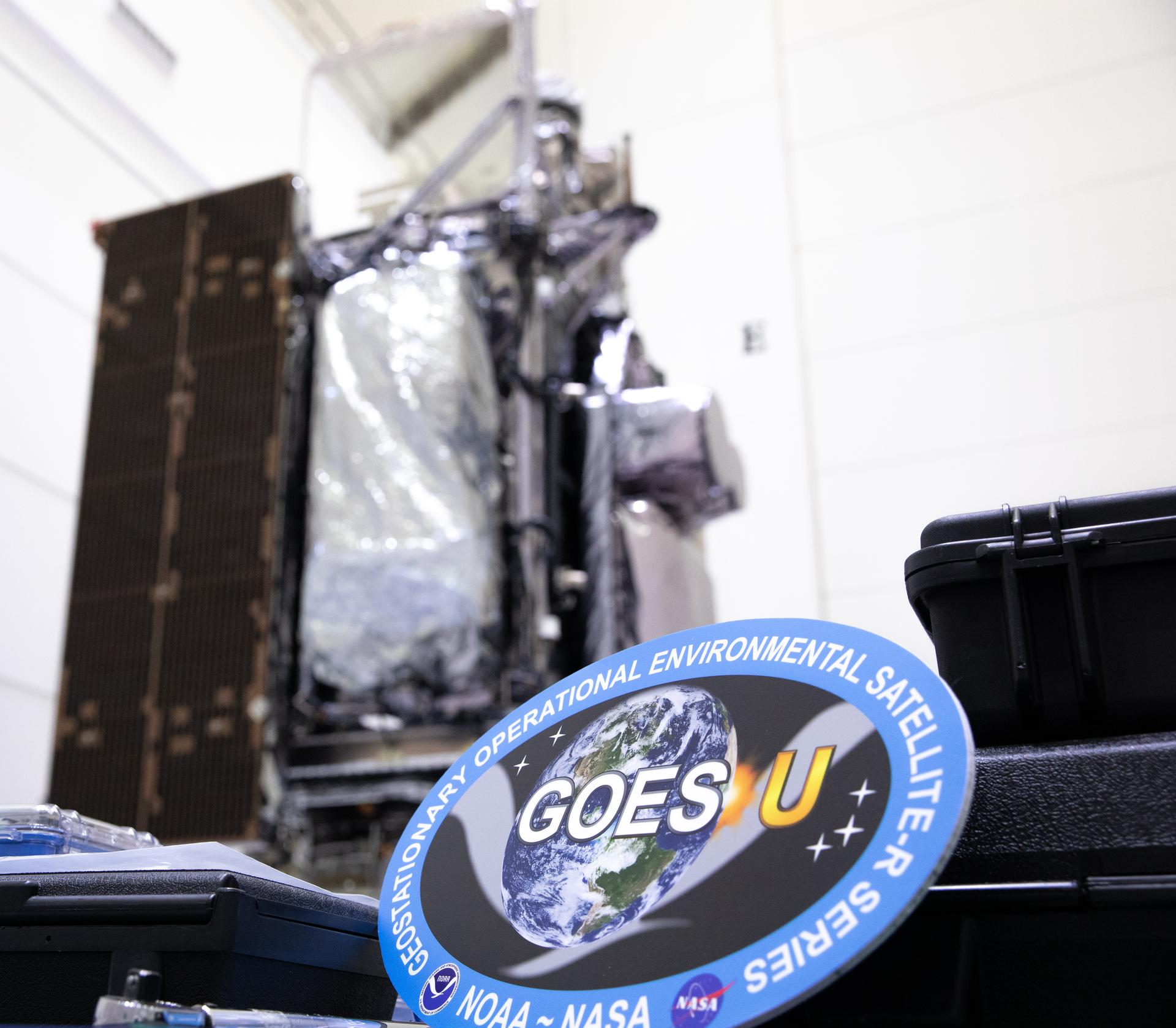
NASA Invites Social Creators for Launch of NOAA Weather Satellite
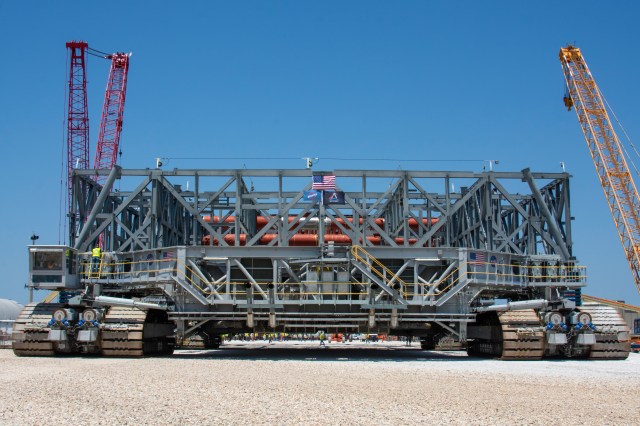
NASA’s New Mobile Launcher Stacks Up for Future Artemis Missions
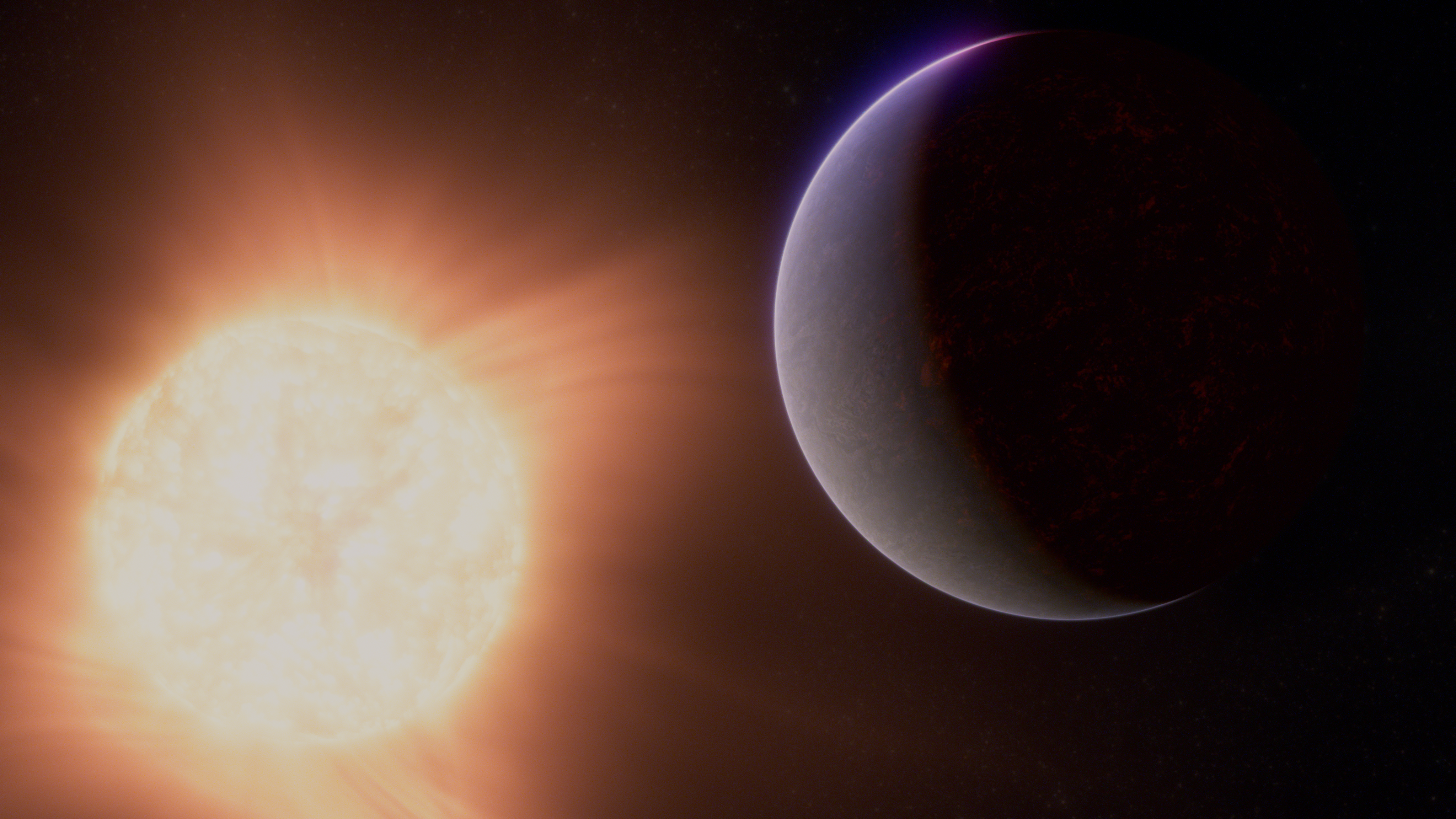
NASA’s Webb Hints at Possible Atmosphere Surrounding Rocky Exoplanet
- Search All NASA Missions
- A to Z List of Missions
- Upcoming Launches and Landings
- Spaceships and Rockets
- Communicating with Missions
- James Webb Space Telescope
- Hubble Space Telescope
- Why Go to Space
- Astronauts Home
- Commercial Space
- Destinations
- Living in Space
- Explore Earth Science
- Earth, Our Planet
- Earth Science in Action
- Earth Multimedia
- Earth Science Researchers
- Pluto & Dwarf Planets
- Asteroids, Comets & Meteors
- The Kuiper Belt
- The Oort Cloud
- Skywatching
- The Search for Life in the Universe
- Black Holes
- The Big Bang
- Dark Energy & Dark Matter
- Earth Science
- Planetary Science
- Astrophysics & Space Science
- The Sun & Heliophysics
- Biological & Physical Sciences
- Lunar Science
- Citizen Science
- Astromaterials
- Aeronautics Research
- Human Space Travel Research
- Science in the Air
- NASA Aircraft
- Flight Innovation
- Supersonic Flight
- Air Traffic Solutions
- Green Aviation Tech
- Drones & You
Technology Transfer & Spinoffs
- Space Travel Technology
- Technology Living in Space
- Manufacturing and Materials
- Science Instruments
- For Kids and Students
- For Educators
- For Colleges and Universities
- For Professionals
- Science for Everyone
- Requests for Exhibits, Artifacts, or Speakers
- STEM Engagement at NASA
- NASA's Impacts
- Centers and Facilities
- Directorates
- Organizations
- People of NASA
- Internships
- Our History
- Doing Business with NASA
- Get Involved
- Aeronáutica
- Ciencias Terrestres
- Sistema Solar
- All NASA News
- Video Series on NASA+
- Newsletters
- Social Media
- Media Resources
- Upcoming Launches & Landings
- Virtual Events
- Sounds and Ringtones
- Interactives
- STEM Multimedia
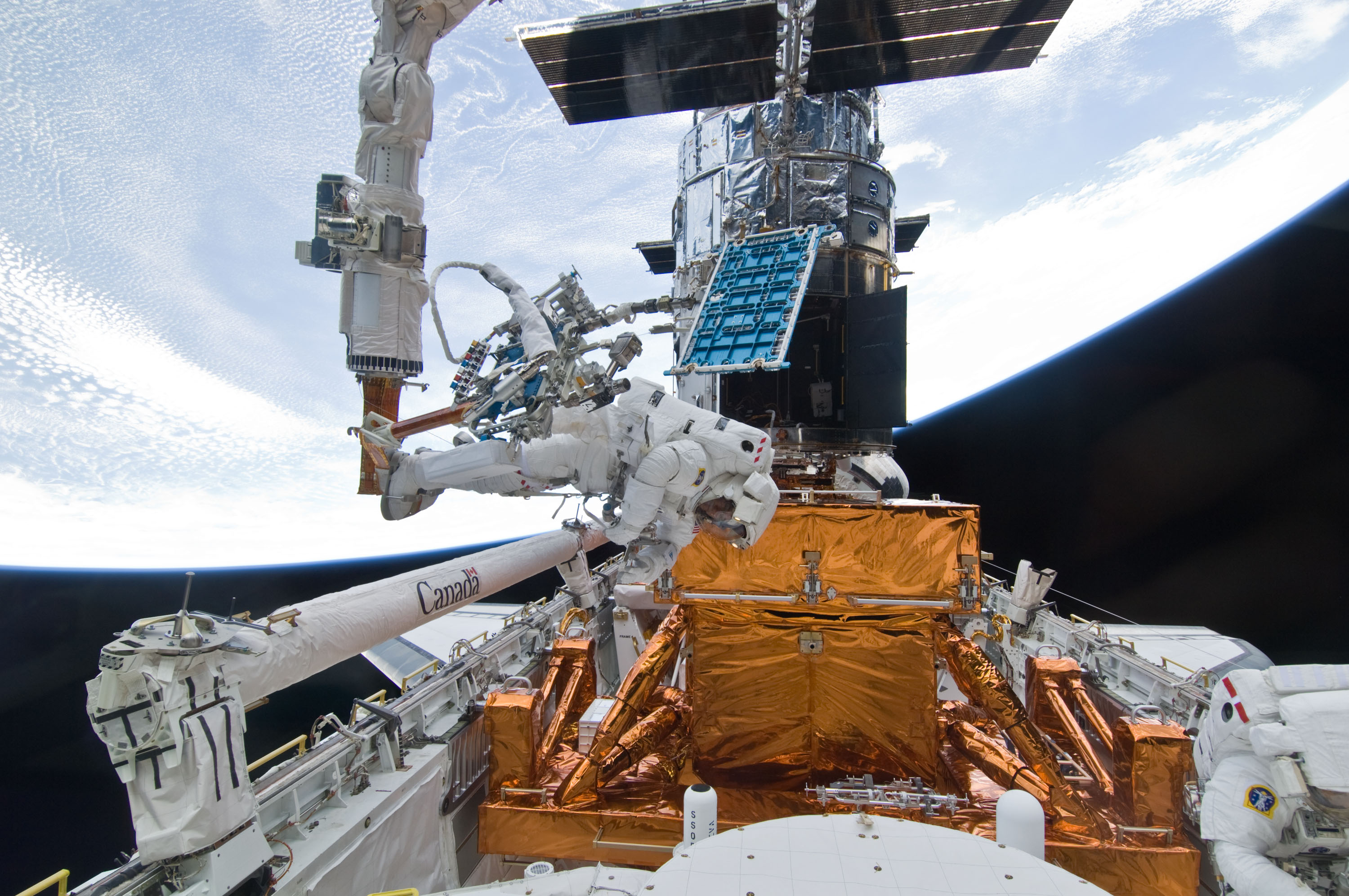
Hubble Celebrates the 15th Anniversary of Servicing Mission 4
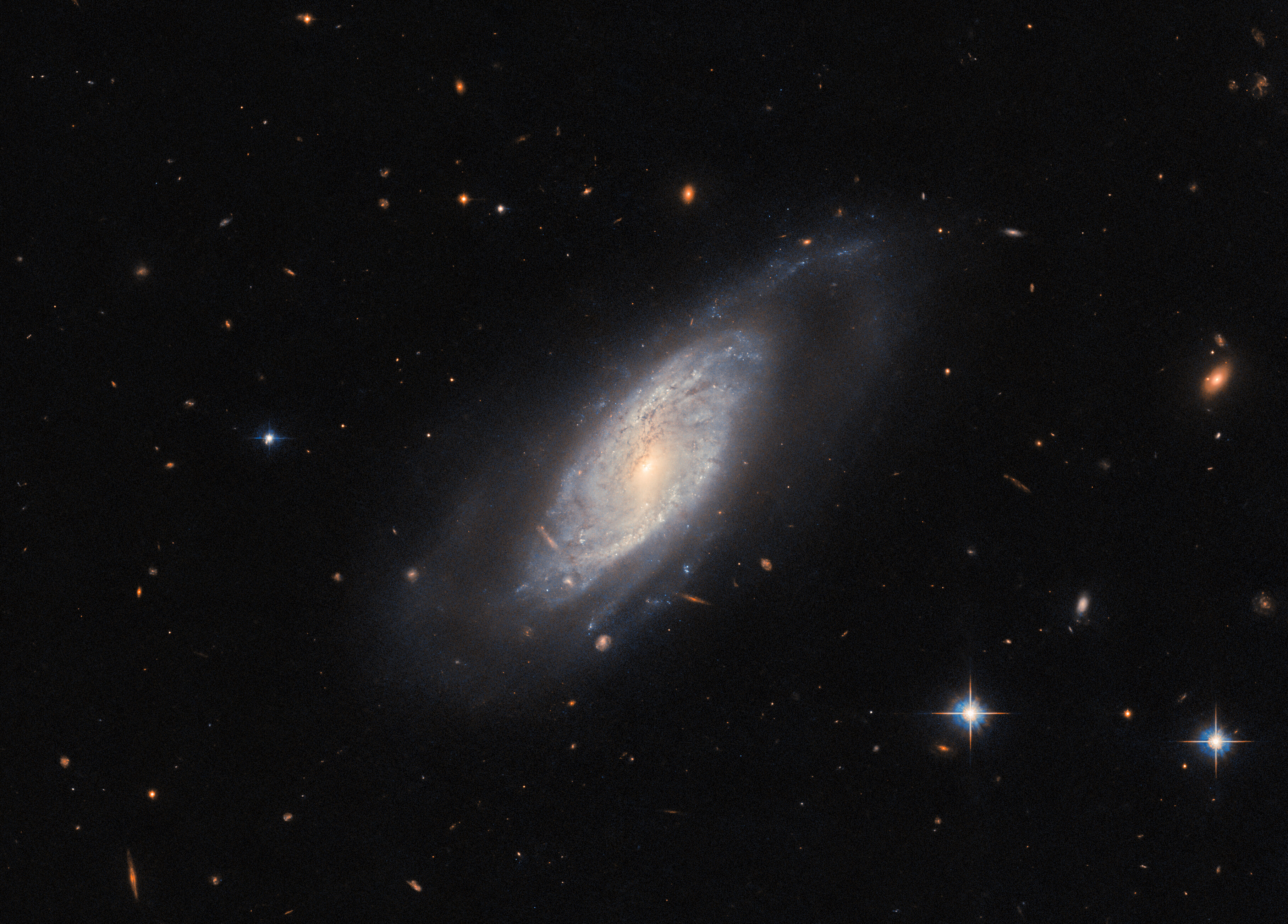
Hubble Glimpses a Star-Forming Factory

NASA Mission Strengthens 40-Year Friendship

NASA Selects Commercial Service Studies to Enable Mars Robotic Science

NASA’s Commercial Partners Deliver Cargo, Crew for Station Science
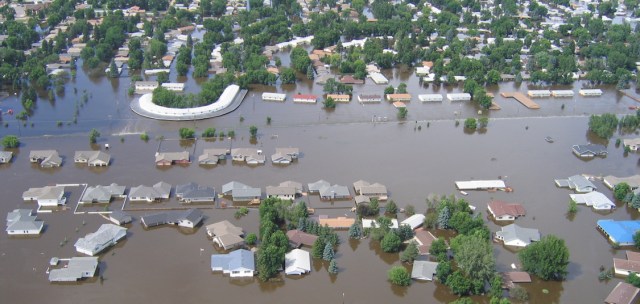
International SWOT Mission Can Improve Flood Prediction

NASA Is Helping Protect Tigers, Jaguars, and Elephants. Here’s How.
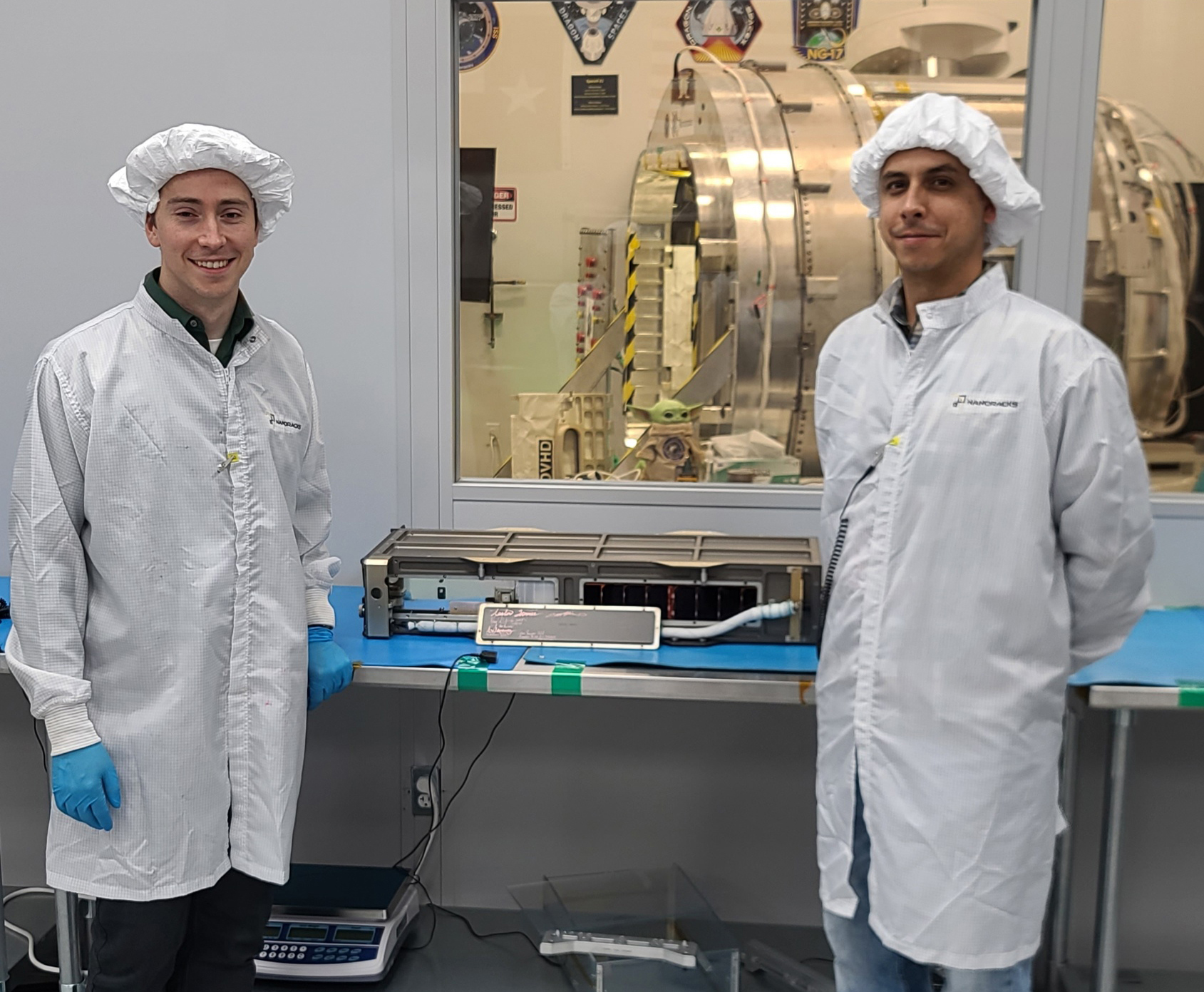
Two Small NASA Satellites Will Measure Soil Moisture, Volcanic Gases
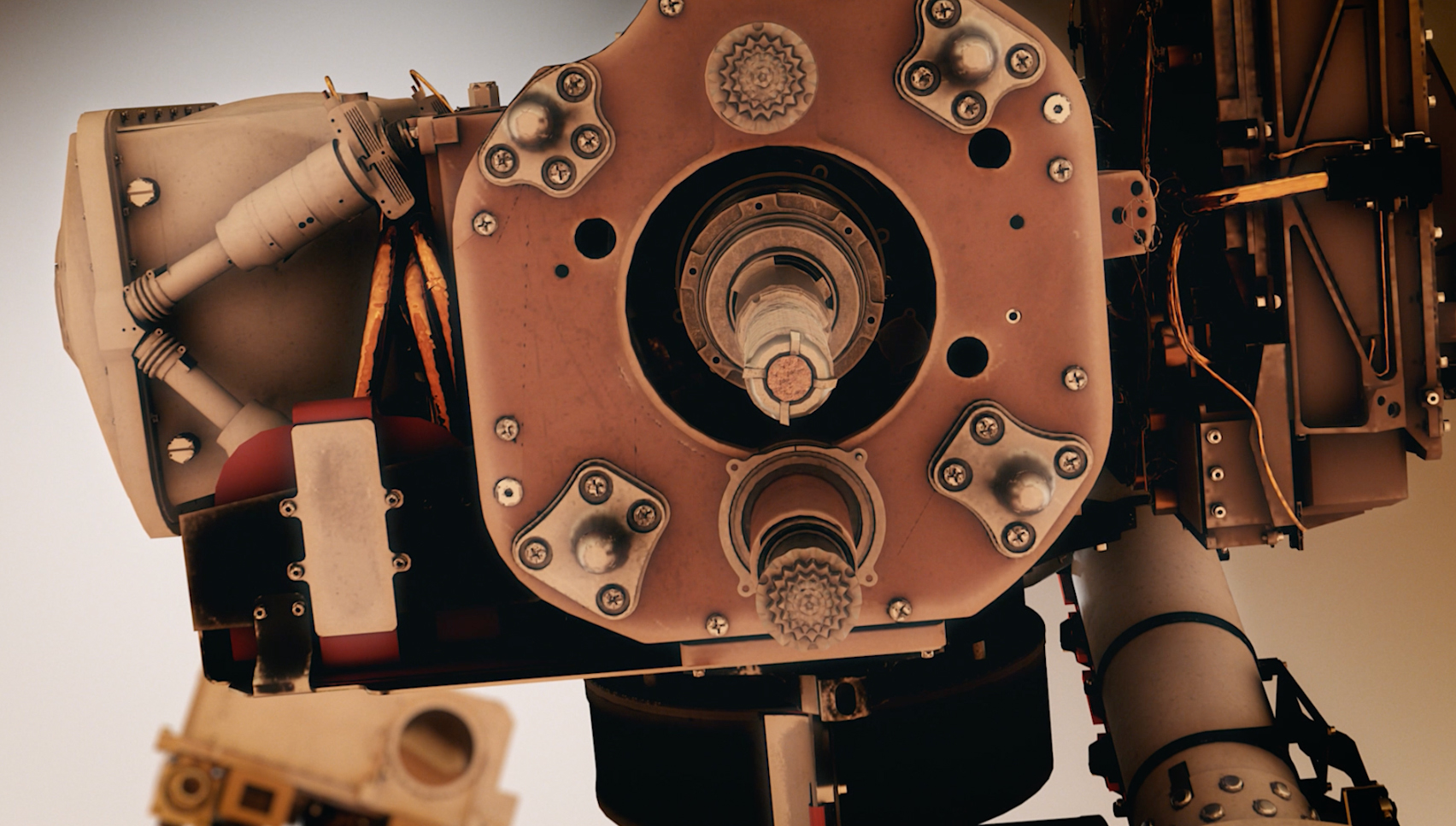
C.26 Rapid Mission Design Studies for Mars Sample Return Correction and Other Documents Posted
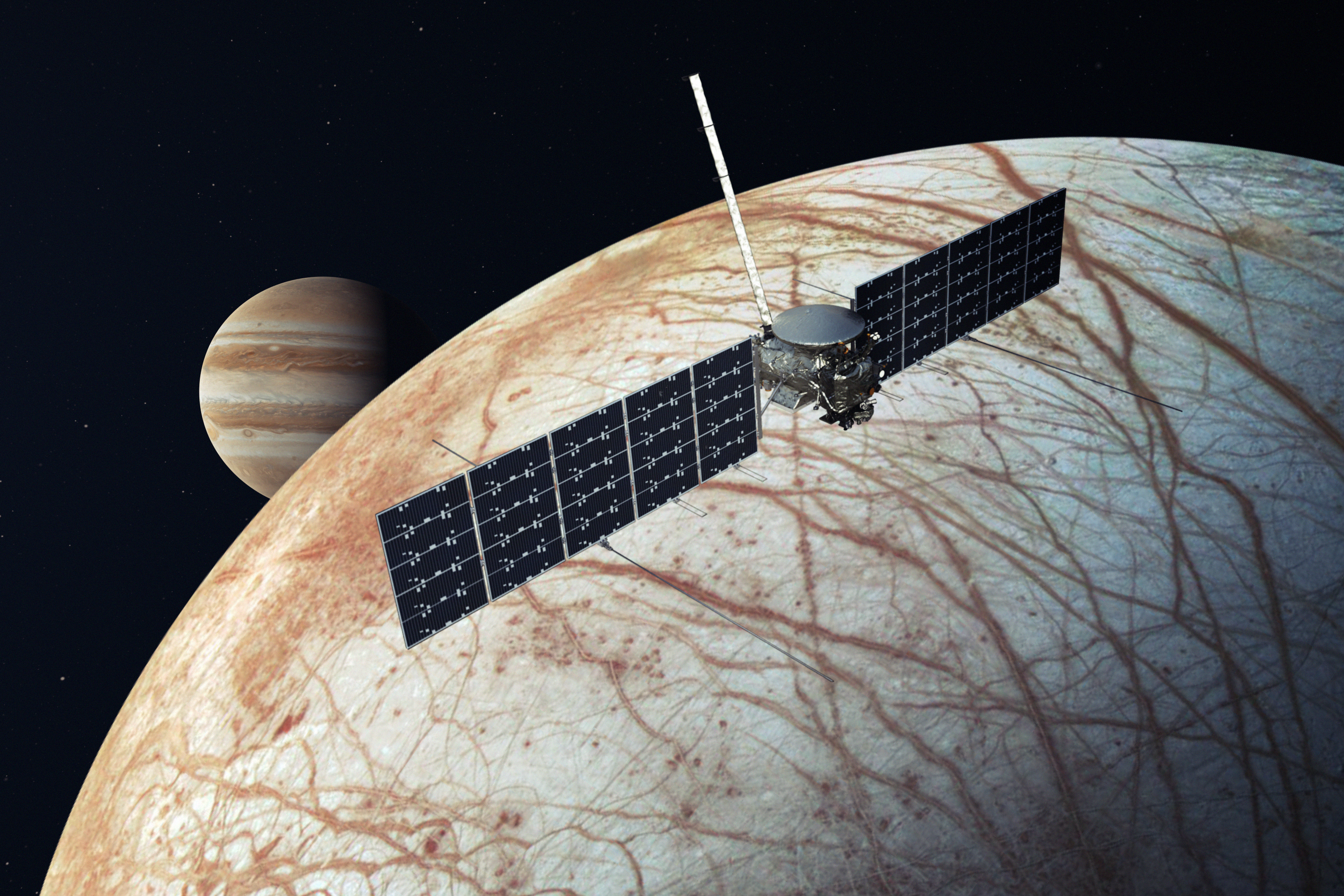
NASA Selects Students for Europa Clipper Intern Program

The Big Event, 2024
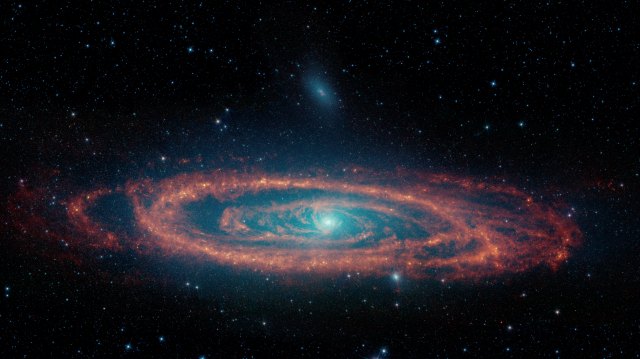
NASA Images Help Explain Eating Habits of Massive Black Hole

NASA Licenses 3D-Printable Superalloy to Benefit US Economy

ARMD Solicitations
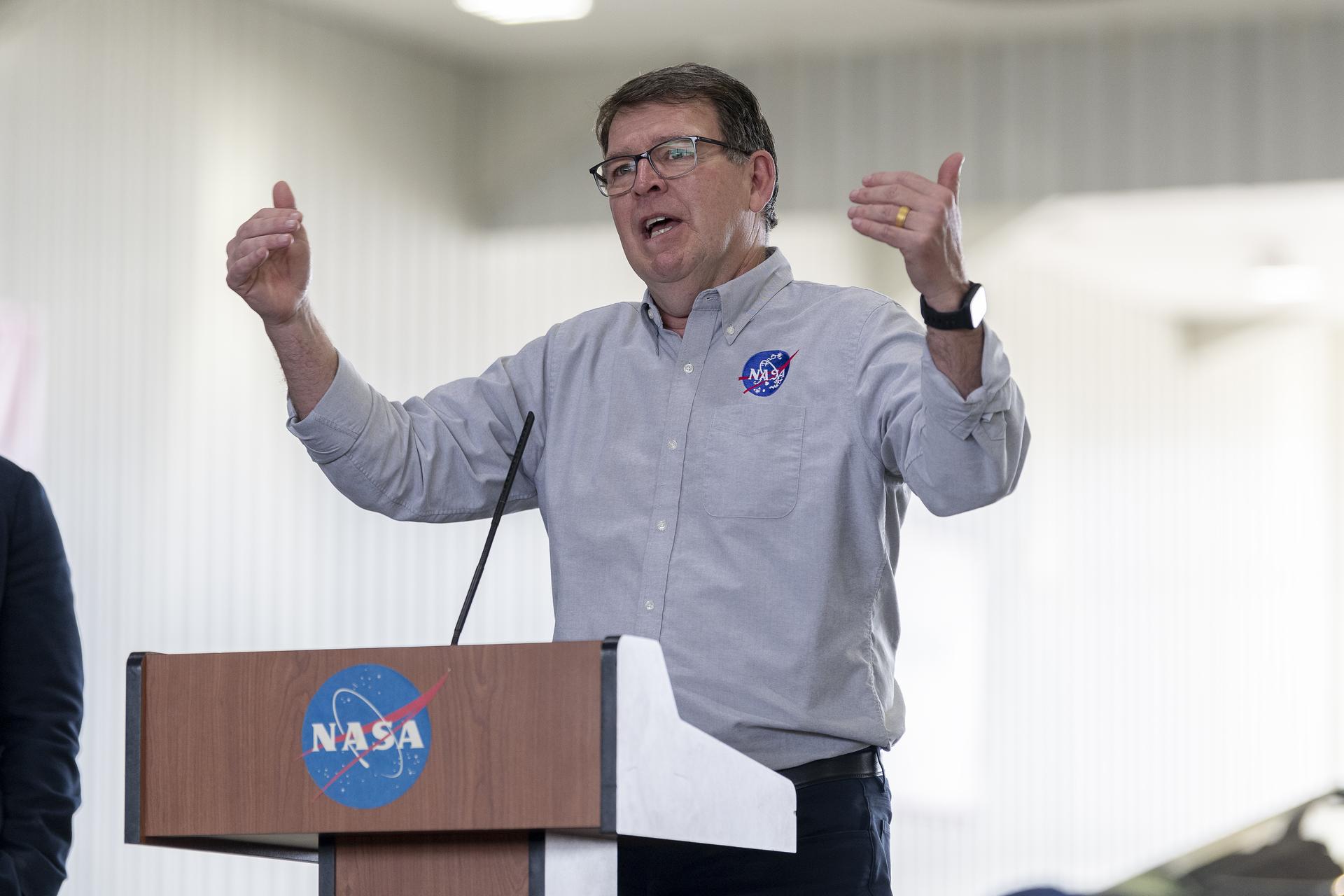
NASA’s Commitment to Safety Starts with its Culture
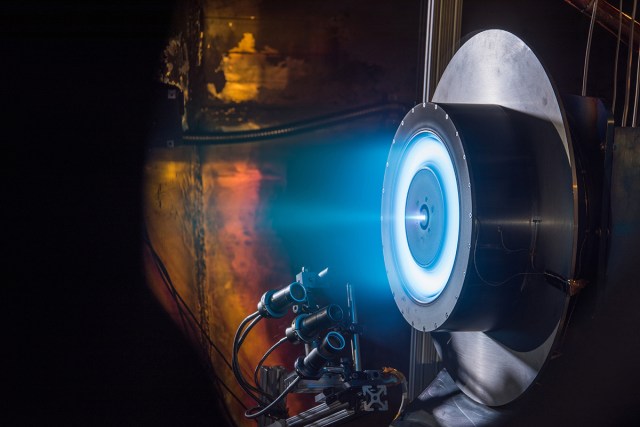
Tech Today: NASA’s Ion Thruster Knowhow Keeps Satellites Flying
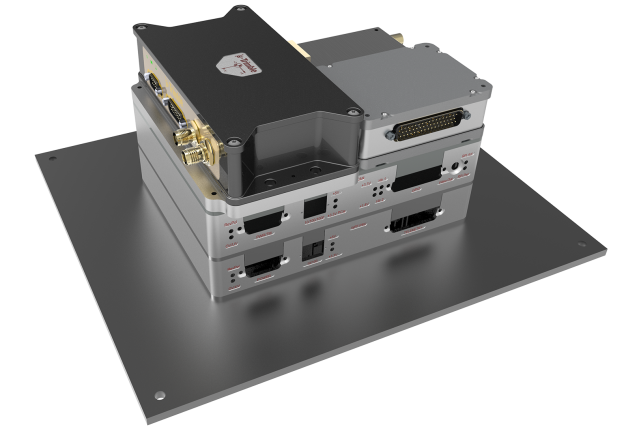
Big Science Drives Wallops’ Upgrades for NASA Suborbital Missions
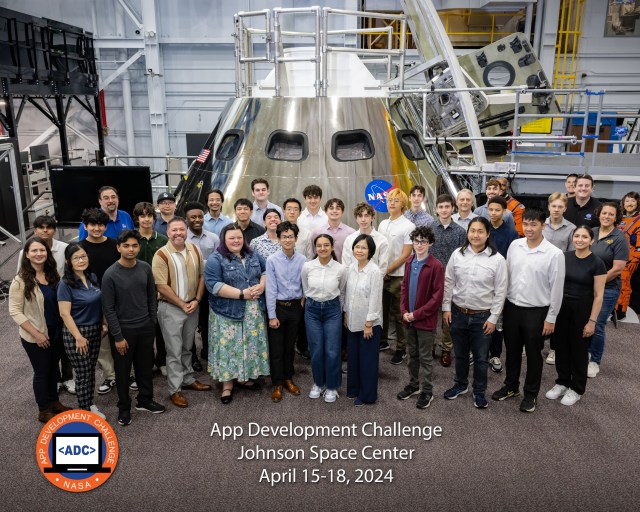
NASA Challenge Gives Artemis Generation Coders a Chance to Shine
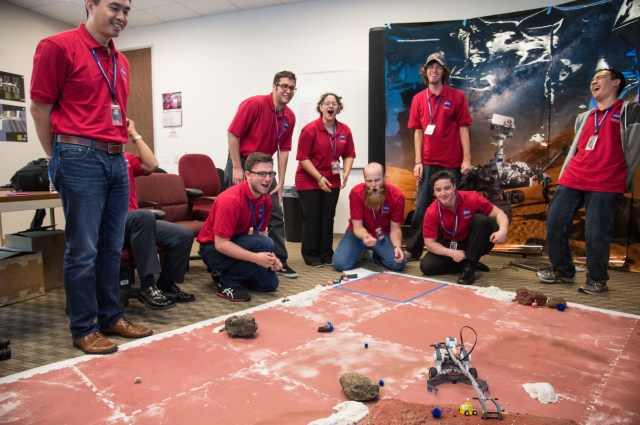
NASA Community College Aerospace Scholars

Johnson Celebrates AA and NHPI Heritage Month: Kimia Seyedmadani
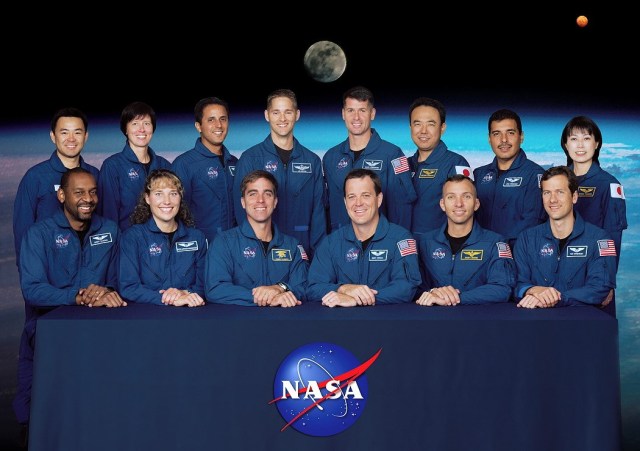
20 Years Ago: NASA Selects its 19th Group of Astronauts

Diez maneras en que los estudiantes pueden prepararse para ser astronautas

Astronauta de la NASA Marcos Berríos

Resultados científicos revolucionarios en la estación espacial de 2023
Andrew Wagner
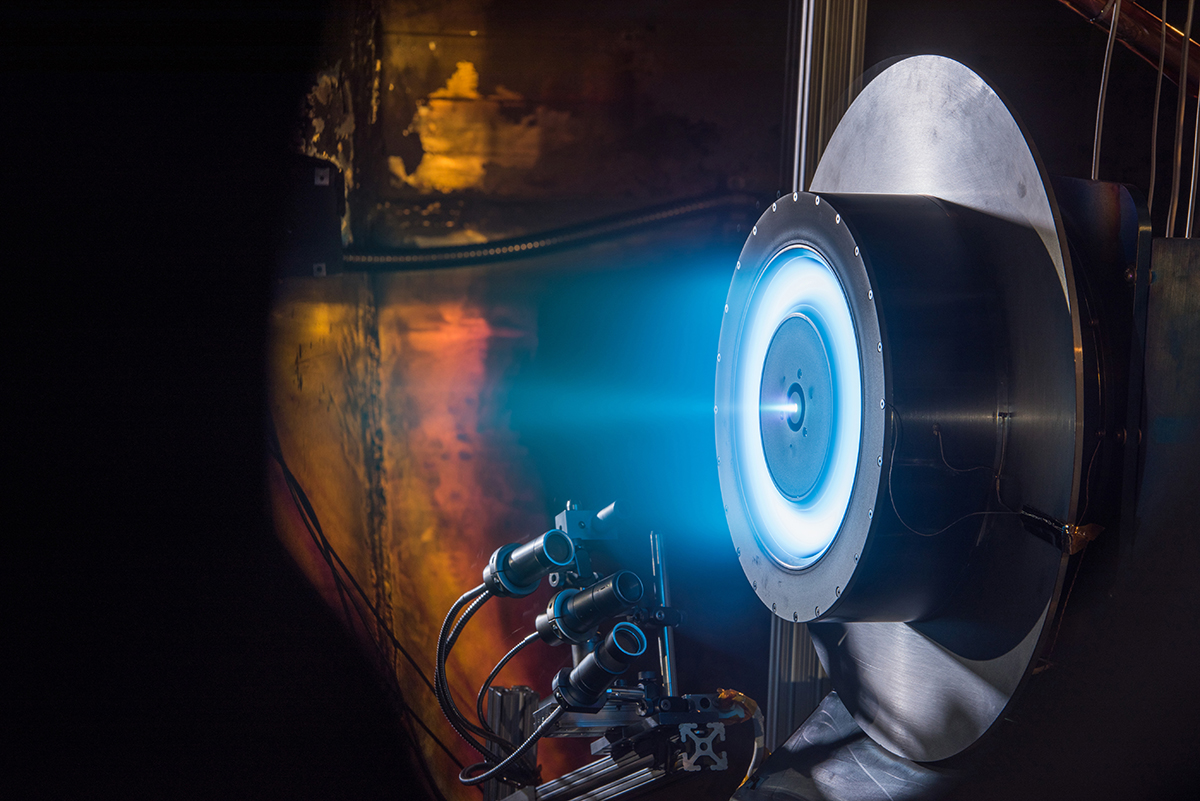
In low Earth orbit, satellites face a constant challenge – a tiny amount of atmospheric drag that, over time, causes them to slow down and decay their orbit. To combat this, spacecraft rely on in-space thrusters to adjust positioning and boost orbits. However, most of these thrusters use heavy, expensive chemical propellants. This is where the game-changing ion thrusters come in, offering a more efficient and cost-effective solution for satellite operations.
Orbion Space Technology, based in Houghton, Michigan, was established in 2016. Recognizing a market need, the company set out to find innovative ways to either extend the lifespan of satellites in orbit or increase their payload capacity. This ambitious goal necessitated the development of a thruster that could operate efficiently with minimal fuel consumption, leading to the creation of the company’s Aurora thruster.
Hall-effect thrusters, an advanced ion propulsion technology , use electricity rather than chemical reactions to propel spacecraft. Orbion’s founders saw the technology grow from an experimental concept to being regularly used on missions across the solar system. Still, the company had to turn to the experts to make these thrusters viable for satellite operators.
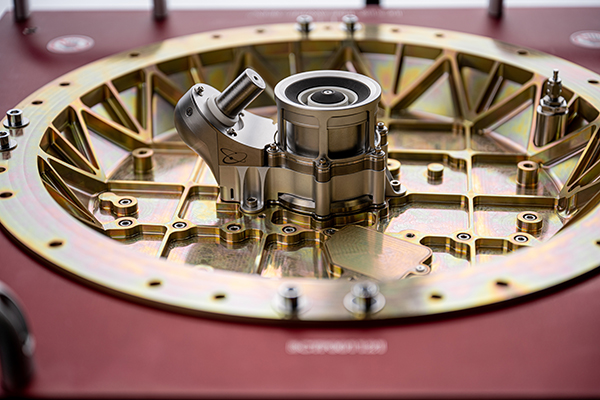
NASA’s Glenn Research Center in Cleveland leads the development of ion thrusters for the agency, designing and evaluating thrusters for missions like Dawn and DART and the agency’s Gateway lunar space station. Orbion entered into a Data Usage Agreement with NASA Glenn to receive detailed information from the development of these engines and a non-exclusive evaluation license. One of the reasons Orbion turned to NASA was its advancements in materials research for ion thrusters and the Glenn-developed cathode heater, which improves electrical efficiency and operating life.
This work resulted in Orbion’s Aurora thrusters being just as capable as those that NASA builds for its deep space science and exploration missions. Orbion has since sold several Aurora thrusters to government and private sector companies, including a recent contract with a large commercial satellite operator for its new constellation of Earth-observing spacecraft.
Related Terms
Glenn Research Center
- Technology Transfer
Explore More

1942: Engine Roars to Life in First Test at Future NASA Glenn

Tech Today: Stay Safe with Battery Testing for Space
NASA battery safety exams influence commercial product testing
Discover Related Topics

Solar Electric Propulsion
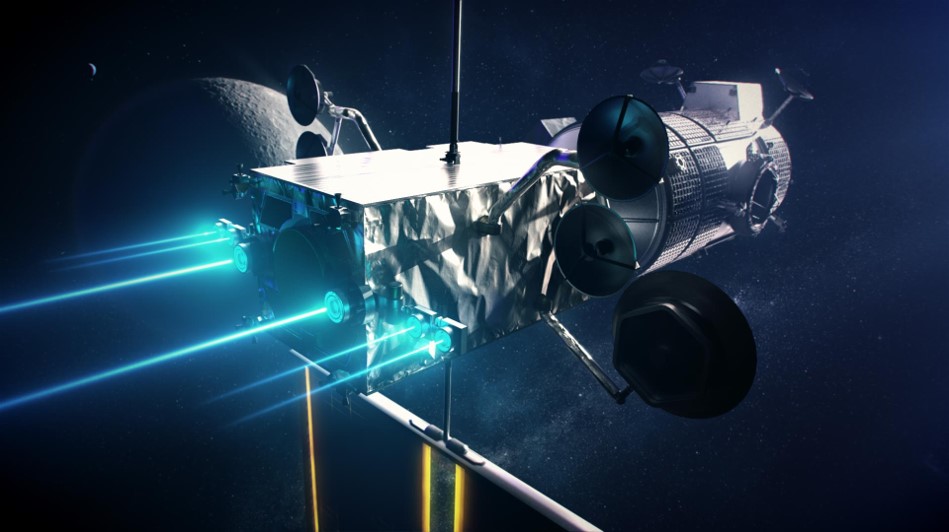
New machine learning algorithm promises advances in computing
Digital twin models may enhance future autonomous systems.
Systems controlled by next-generation computing algorithms could give rise to better and more efficient machine learning products, a new study suggests.
Using machine learning tools to create a digital twin, or a virtual copy, of an electronic circuit that exhibits chaotic behavior, researchers found that they were successful at predicting how it would behave and using that information to control it.
Many everyday devices, like thermostats and cruise control, utilize linear controllers -- which use simple rules to direct a system to a desired value. Thermostats, for example, employ such rules to determine how much to heat or cool a space based on the difference between the current and desired temperatures.
Yet because of how straightforward these algorithms are, they struggle to control systems that display complex behavior, like chaos.
As a result, advanced devices like self-driving cars and aircraft often rely on machine learning-based controllers, which use intricate networks to learn the optimal control algorithm needed to best operate. However, these algorithms have significant drawbacks, the most demanding of which is that they can be extremely challenging and computationally expensive to implement.
Now, having access to an efficient digital twin is likely to have a sweeping impact on how scientists develop future autonomous technologies, said Robert Kent, lead author of the study and a graduate student in physics at The Ohio State University.
"The problem with most machine learning-based controllers is that they use a lot of energy or power and they take a long time to evaluate," said Kent. "Developing traditional controllers for them has also been difficult because chaotic systems are extremely sensitive to small changes."
These issues, he said, are critical in situations where milliseconds can make a difference between life and death, such as when self-driving vehicles must decide to brake to prevent an accident.
The study was published recently in Nature Communications.
Compact enough to fit on an inexpensive computer chip capable of balancing on your fingertip and able to run without an internet connection, the team's digital twin was built to optimize a controller's efficiency and performance, which researchers found resulted in a reduction of power consumption. It achieves this quite easily, mainly because it was trained using a type of machine learning approach called reservoir computing.
"The great thing about the machine learning architecture we used is that it's very good at learning the behavior of systems that evolve in time," Kent said. "It's inspired by how connections spark in the human brain."
Although similarly sized computer chips have been used in devices like smart fridges, according to the study, this novel computing ability makes the new model especially well-equipped to handle dynamic systems such as self-driving vehicles as well as heart monitors, which must be able to quickly adapt to a patient's heartbeat.
"Big machine learning models have to consume lots of power to crunch data and come out with the right parameters, whereas our model and training is so extremely simple that you could have systems learning on the fly," he said.
To test this theory, researchers directed their model to complete complex control tasks and compared its results to those from previous control techniques. The study revealed that their approach achieved a higher accuracy at the tasks than its linear counterpart and is significantly less computationally complex than a previous machine learning-based controller.
"The increase in accuracy was pretty significant in some cases," said Kent. Though the outcome showed that their algorithm does require more energy than a linear controller to operate, this tradeoff means that when it is powered up, the team's model lasts longer and is considerably more efficient than current machine learning-based controllers on the market.
"People will find good use out of it just based on how efficient it is," Kent said. "You can implement it on pretty much any platform and it's very simple to understand." The algorithm was recently made available to scientists.
Outside of inspiring potential advances in engineering, there's also an equally important economic and environmental incentive for creating more power-friendly algorithms, said Kent.
As society becomes more dependent on computers and AI for nearly all aspects of daily life, demand for data centers is soaring, leading many experts to worry over digital systems' enormous power appetite and what future industries will need to do to keep up with it.
And because building these data centers as well as large-scale computing experiments can generate a large carbon footprint, scientists are looking for ways to curb carbon emissions from this technology.
To advance their results, future work will likely be steered toward training the model to explore other applications like quantum information processing, Kent said. In the meantime, he expects that these new elements will reach far into the scientific community.
"Not enough people know about these types of algorithms in the industry and engineering, and one of the big goals of this project is to get more people to learn about them," said Kent. "This work is a great first step toward reaching that potential."
This study was supported by the U.S. Air Force's Office of Scientific Research. Other Ohio State co-authors include Wendson A.S. Barbosa and Daniel J. Gauthier.
- Electronics
- Telecommunications
- Energy Technology
- Computers and Internet
- Neural Interfaces
- Information Technology
- Computer Science
- Artificial intelligence
- Alan Turing
- Computing power everywhere
- Grid computing
- Data mining
Story Source:
Materials provided by Ohio State University . Original written by Tatyana Woodall. Note: Content may be edited for style and length.
Journal Reference :
- Robert M. Kent, Wendson A. S. Barbosa, Daniel J. Gauthier. Controlling chaos using edge computing hardware . Nature Communications , 2024; 15 (1) DOI: 10.1038/s41467-024-48133-3
Cite This Page :
Explore More
- Controlling Shape-Shifting Soft Robots
- Brain Flexibility for a Complex World
- ONe Nova to Rule Them All
- AI Systems Are Skilled at Manipulating Humans
- Planet Glows With Molten Lava
- A Fragment of Human Brain, Mapped
- Symbiosis Solves Long-Standing Marine Mystery
- Surprising Common Ideas in Environmental ...
- 2D All-Organic Perovskites: 2D Electronics
- Generative AI That Imitates Human Motion
Trending Topics
Strange & offbeat.

IMAGES
VIDEO
COMMENTS
Here are some tips to help you write space research papers: Choose a Narrow Topic: Space is a vast field with numerous sub-disciplines. Narrow down your topic to something specific and manageable, ensuring that it aligns with your interests and expertise. Conduct Thorough Research: Before you start writing, immerse yourself in the existing ...
A review of the recent space exploration breakthroughs. The moon landing. The Mars landing of space rovers. A deeper look at the history of astronomy. Reviewing the heliocentric model of the galaxy. Analyzing the lifecycle of a star.
Research topics about space are relatively easy to find considering the broad research areas, which include: Earth observations, Geodesy, Atmospheric Sciences, Space physics, Planetology, Astronomy, Materials sciences, Life sciences, and Physics. Space research paper topics must stimulate and birth inquiry and answer compelling questions.
Solar system surveys have revealed new moons and massive comets previously lurking undetected by scientists. The sun has also been a main attraction for research as it reawakens from its recent ...
Research Topics List. JPL's charter is to conduct robotic space missions for NASA, to explore our own and neighboring planetary systems, understand the origin and evolution of the universe and make critical measurements to understand our home planet and help protect it. We do this by developing integrated capabilities in engineering, science ...
Research topics. Astrophysical Magnetism and the Interstellar Medium. What fills the space between the stars? In addition to stars, planets, and dark matter, galaxies are home to vast reservoirs of gas and dust, high-energy particles, and magnetic fields. This is the interstellar medium (ISM): the stuff between the stars.
With recent advances in commercial space exploration, we have curated a list of our best Research Topics on outer space. Explore collections edited by experts from NASA, The Goddard Space Flight Center, Space Science Institute, German Aerospace Center, Canadian Space Agency, National Space Science Center, European Space Agency, International ...
Space physics is the study of the natural phenomenon that occur in our solar system. Specifically, the sun, the particles and radiation it creates and how these affect the planets. This includes ...
Space News. Find all the latest space news right now on SciTechDaily, your ultimate gateway to the cosmos and its countless wonders. We provide you with up-to-date information on the latest discoveries, innovations, and research in space exploration, astronomy, and astrophysics. Our expertly curated content covers a diverse range of topics ...
The Space topic features the latest news in astronomy, cosmology, planetary science, exoplanets, astrobiology and more. ... NASA's budget woes put ambitious space research at risk By Adam Mann ...
The International Space Station, in its third decade of continuous human presence, has far-reaching impact as a microgravity lab hosting technology demonstrations and scientific investigations from a range of fields. Between Oct. 1, 2021 and Sept. 30, 2022, researchers published more than 400 scientific papers based on studies conducted aboard ...
Space.com is your source for the latest astronomy news and space discoveries, live coverage of space flights and the science of space travel.
154 Astronomy Research Topics: Rocket To Your Marvelous Grades. Every student knows that the key to writing an excellent research assignment starts with choosing an interesting topic that captures the reader's attention and explores new areas within the discipline. Some research topics come to students naturally, but often coming up with a ...
IceBridge. ICESat (Ice, Clouds and Land Elevation Satellite) ICESat-2 (Ice, Cloud and land Elevation Satellite-2) ICON (Ionospheric Connection Explorer) Ida. IEH-3 (International Extreme Ultraviolet Hitchhiker) Ilan Ramon. IMAGE (Imager for Magnetopause-to-Aurora Global Exploration) Images & Media Guidelines.
Space Research Paper Topics. These focus on topics related to space exploration and observations. Some high-quality interesting topics that native writers, students, and class teachers will find useful include: ... Interesting Space Topics. Space debris: challenges and solutions for orbital cleanup; Space mining: opportunities and ethical ...
Our article explores ten key astronomy research topics, each offering a gateway to understanding the complex phenomena that govern the stars, planets, and galaxies, inviting readers to dive deep into the wonders of space. Gain insights into the complex forces shaping the cosmos, from the smallest particles to the largest structures.
Multi-Robot Systems for Space Applications. Jorge Pomares. Damiano Varagnolo. Leonard Felicetti. 20,691 views. 4 articles. An exciting journal which advances our understanding of space technologies and their commercialization - from weather forecasting to satellite navigation.
Complex Astronomy Project Ideas. If you want to write a complex paper that will earn you a very good grade, you need to see our amazing list of astronomy topics for projects: The ins and outs of robotic space exploration. The future of space exploration. Making business in space.
In terms of size, it is the largest of all the planets and it is number five from the sun."The diameter of Jupiter is 142984 kilometers and its density is 1. The Main Reasons for Space Exploration. In 1957, the Soviet successfully launched the first satellite into space that marked the beginning of space exploration.
List of topics in space; topics as related to outer space. Accidents in space; Animals in space; Architecture in space; Batteries in space; Christmas in space; Corrosion in space; Death in space; Dogs in space; Dust in space; Economy in space (Mining in space) Garbage in space; Humans in space; Hygiene in space;
123 Topics about Space. For a space essay, you need a rocketing title! Welcome to our space essay topics, where we journey beyond Earth's boundaries. Space exploration, astronomy, and the mysteries of the universe have captivated human curiosity for centuries! Go through these space topics for presentation and uncover the wonders arising from ...
NASA/Goddard Space Flight Center. "Iron fingerprints in nearby active galaxy." ScienceDaily. www.sciencedaily.com / releases / 2024 / 05 / 240508113126.htm (accessed May 8, 2024).
New space technology ideas emerge every day from innovators across the country, and NASA's Small Business Innovation Research (SBIR) program on Monday selected more than 100 projects for funding. This program offers small businesses in the United States early-stage funding and support to advance the agency's goals of exploring the unknown ...
There are always more interesting topics to research in these areas. Exploring the Origins of the Universe: Big Bang Theory vs. Multiverse Theory. Enhancing Creativity through Neuroscience Research. The Physics of Black Holes: Mysteries and Discoveries. The Future of Space Exploration: Mars Colonization and Beyond.
Mars Sample Return and missions to study other planets and celestial bodies, including lunar efforts, face big cuts and delays.
Proteus Ocean Group - co-founded by Fabien Cousteau, grandson of the late ocean exploration pioneer Jacques Cousteau - is developing an "underwater space station of the ocean." The group ...
During a stroll through the Berlin Botanic Garden in 2019, HHMI Janelia Research Campus Group Leader Jan Funke and some of his scientific colleagues started chatting about a familiar topic: how to ...
This Hall-effect thruster, shown being tested at Glenn Research Center, turns electricity and inert gas into force that could propel a spacecraft. Orbion Space Technology was founded to bring the high efficiency of these thrusters to small commercial satellites, and the company sought the center's help to make that a reality.
This study was supported by the U.S. Air Force's Office of Scientific Research. Other Ohio State co-authors include Wendson A.S. Barbosa and Daniel J. Gauthier. RELATED TOPICS